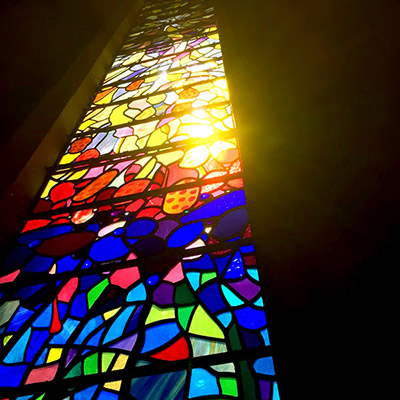
Weekly Reflection
Each week the Dean offers a reflection through which he seeks to speak to the world in which we live and to explore how our life and faith intersect.
The riches of the Christian and other spiritual traditions, poetry, art, music and the writings of commentators who are trying to make sense of our lives and create a better world are brought together.
The Dean welcomes you feedback and insights.
Click here to Email the Dean
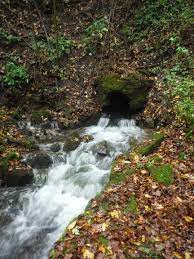
Monday 13th March, 2023
I don’t know who God is exactly….
Click for more
But I’ll tell you this.
I was sitting in the river named Clarion, on a water splashed stone
and all afternoon I listened to the voices of the river talking.
Whenever the water struck a stone it had something to say,
and the water itself, and even the mosses trailing under the water.
And slowly, very slowly, it became clear to me what they were saying.
Said the river I am part of holiness.
And I too, said the stone. And I too, whispered the moss beneath the water.
I’d been to the river before, a few times.
Don’t blame the river that nothing happened quickly.
You don’t hear such voices in an hour or a day.
You don’t hear them at all if selfhood has stuffed your ears.
And it’s difficult to hear anything anyway, through all the traffic, the ambition.
Mary Oliver, At the River Clarion
For me, one of the delights associated with walking through the countryside is suddenly coming across a natural spring. Dry, almost bare, forest can suddenly be transformed into a landscape full of dynamism, teeming with life. In such places, the croaking of frogs, the twitter of birds, the buzzing of insects and the rustle of animals in leaf litter are cast into a scene full of lush, diverse vegetation. In many places some of the water is directed into pipes to allow walkers to replenish their stocks for the next long dry section of the journey.
Most of the places I have walked have been relatively well-watered so I can only imagine what it was like in years gone by for those who came across springs welling up in the desert.
As Mary Oliver observes in her poem, At the River Clarion, water conjures up thoughts of the divine. Life-giving springs, particularly in deserts, with the super abundance of life and colour they support, demonstrate why we make such associations.
On Sunday we encountered the story of Moses striking the rock in the desert in order to provide water for the parched people as they journeyed through the wilderness (Exodus 17.1-7).
It is a story that spoke to many generations of God’s love and abundance. In the early Christian tradition the image of the life-giving rock became associated with Christ (1 Corinthians 10.4). We drink from the rock and find ourselves enlivened.
Water is life in more ways than one.
In At the River Clarion, Mary Oliver notes that in order to appreciate the significance of what we encounter in and through water, we need to take the time to become attentive. She also notes the challenge this poses in a time dominated by all the traffic, the ambition.
Peace,
Peter+

Monday 6th March, 2023
Wednesday is International Women’s Day. It one of the days, among the many causes and various ‘International Days’, that we observe deliberately and clearly each year.
Click for more
We do this because the inequalities that women face are so incredibly significant, debilitating, and life threatening and because the perpetuation of those inequities has flow-on effects for the well-being of children and the planet.
As members of the church we have a particular reason to highlight the need for women to be afforded equality: that is the need to resist the creeping resurgence ofComplementarianism.
Complementarianism holds that women and men have different but complementary roles to play in marriage, family and the life of religious intuitions. It takes basic biological differences, magnifies their importance and insists that they are concrete determinants of role and capacity.
This sees women being portrayed not only as child-bearers, but as the only child nurturers, confines both genders (for Complementarianism denies that gender-diversity exists) to specific gendered roles, affirms male-headship and limits the leadership roles that women can occupy in the Church. Such framing leads to power imbalances in relationships and increases the likelihood of abuse, violence and coercive control.
Here at St John’s and in the life of the wider Diocese we are seeking to address and limit the effects of this life-diminishing and dangerous idea.
To celebrate this important day we will be hosting a paella lunch between Noon to 2pm in St Martin’s Courtyard. Suggested donation $10. To assist with catering, please RSVP if possible to lclarke@stjohnscathedral.com.au. IWD ribbons will be on sale. All Proceeds will be given to UN Women Australia.
Peace,
Peter+
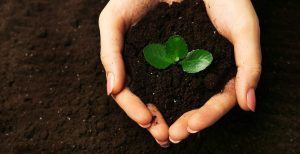
Monday 27th February, 2023
The cosmos dreams in me…
Click for more
while I wait in stillness,
ready to lean a little further
into the heart of the Holy.
I, a little blip of life
a wisp of unassuming love,
a quickly passing breeze,
come once more into Lent.
No need to sign me
with the black bleeding ash
of palms, fried and baked.
I know my humus place.
This Lent I will sail
on the graced wings of desire,
yearning to go deeper
to the place where
I am one in the One.
Oh, may I go there soon,
in the same breath
that takes me to the stars
when the cosmos dreams in me
Joyce Rupp, https://joycerupp.com/lent-2001/
I know my humus place…
In this marvellous poem, Joyce Rupp, describes the Lenten journey. It speaks to me in so many ways.
I find the reference to humus particularly powerful. Humus is the organic matter that makes soil rich and fertile.
I am reminded of the etymological link between humus and humility. To be humble is to be grounded, earthed; to be authentic and life-giving. A humble person knows who they are and expresses their gifts for the benefit of others; to bring them life.
For me, Lent provides the opportunity to become more self-aware and so to develop a better sense of my humus place.
The Cathedral’s Lenten offerings can be accessed here.
Peace,
Peter+
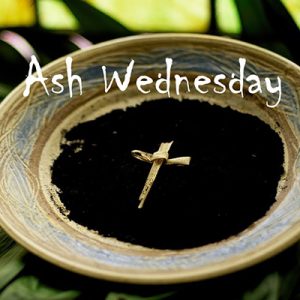
Monday 20th February, 2023
Receive this cross of ash upon your brow…
Click for more
Brought from the burning of Palm Sunday’s cross;
The forests of the world are burning now
And you make late repentance for the loss.
But all the trees of God would clap their hands,
The very stones themselves would shout and sing,
If you could covenant to love these lands
And recognize in Christ their lord and king.
He sees the slow destruction of those trees,
He weeps to see the ancient places burn,
And still you make what purchases you please
And still to dust and ashes you return.
But Hope could rise from ashes even now
Beginning with this sign upon your brow.
Malcolm Guite, The Word in the Wilderness
Yesterday, was the last Sunday before Lent. At the end of our liturgy we burnt last year’s (and few from previous years) palm crosses to make the ash that will be used during our services on Wednesday, Ash Wednesday.
The ashes are placed on our foreheads in the shape of a cross. As this takes place the one placing the ashes says, ‘Remember you are dust and to dust you shall return.’ The words mirror those spoken to Adam and Eve in the second of the Creation stories recorded in Genesis (Chapter 3).
The second Creation story is a collection of etiologies, that is attempts to explain why things are the way they are:
Why is childbirth painful?
Why is growing food such hard work?
Why do snakes bite us?
The community to which to writer belonged had also noticed that human bodies turn to dust as they decay. Hence the story also contains the idea that Adam was formed out of the earth, ‘you are dust…’.
In these days when we are facing an environmental catastrophe it is good to be reminded that we are creatures of the earth. I join with Malcolm Guite in hoping that such a reminder might help us to reorientate ourselves, so that caring for the earth rather than exploiting it, might become our way of living.
Peace,
Peter+
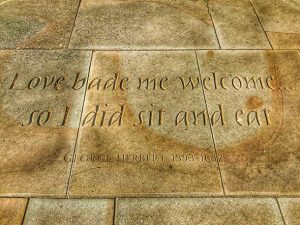
Monday 13th February, 2023
LOVE bade me welcome; yet my soul drew back…
Click for more
Guilty of dust and sin.
But quick-eyed Love, observing me grow slack
From my first entrance in,
Drew nearer to me, sweetly questioning
If I lack’d anything.
‘A guest,’ I answer’d, ‘worthy to be here:’
Love said, ‘You shall be he.’
‘I, the unkind, ungrateful? Ah, my dear,
I cannot look on Thee.’
Love took my hand and smiling did reply,
‘Who made the eyes but I?’
‘Truth, Lord; but I have marr’d them: let my shame
Go where it doth deserve.’
‘And know you not,’ says Love, ‘Who bore the blame?’
‘My dear, then I will serve.’
‘You must sit down,’ says Love, ‘and taste my meat.’
So I did sit and eat.
George Herbert, Love bade me welcome
Tomorrow is Valentine’s Day.
It is tempting to dismiss Valentine’s Day as another superficial day of commercialisation and commodification.
Yet there is nothing superficial about the desire that undergirds it. In fact the commercialisation of the day only works because there is a deep desire in us that it is able to touch and massage.
That deep desire is the desire to be loved. Authentic love includes being known and being accepted by the one who knows us. To be accepted as we are and for who we are.
George Herbert expresses that deep desire in his poem, Love bade me welcome.
He also expresses the fears that are often attached to that desire: the fear of not being good enough to be loved and the fear of being rejected because of who we are.
Herbert’s poems uses the most meaningful name we have for God, Love, and reminds us that we are always welcome to sit at love’s table, despite our fears of rejection.
Developing an appreciation of the fact that we are loved by life’s creative principle can help us move past the first hurdle in the quest for love, that of loving ourselves.
Peace,
Peter+
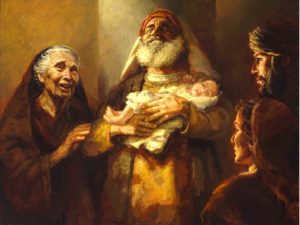
Monday 6th February, 2023
They came, as called, according to the Law….
Click for more
Though they were poor and had to keep things simple,
They moved in grace, in quietness, in awe,
For God was coming with them to His temple.
Amidst the outer court’s commercial bustle
They’d waited hours, enduring shouts and shoves,
Buyers and sellers, sensing one more hustle,
Had made a killing on the two young doves.
They come at last with us to Candlemas
And keep the day the prophecies came true
We glimpse with them, amidst our busyness,
The peace that Simeon and Anna knew.
For Candlemas still keeps His kindled light,
Against the dark our Saviour’s face is bright.
Malcolm Guite, A Sonnet for Candlemass
Yesterday we kept The Feast of the Presentation of Jesus in The Temple. The story appears only in the Gospel according to Luke (Luke 2.22-40).
It is a simple story of the child Jesus being presented to God in the Temple, as the first born son, when he was 40 days old.
This routine visit is used by the author of the Gospel according to Luke to enable two old people, who are deeply imbedded in the Jewish faith, to make statements about who Jesus is and how his life will play out.
The two elderly people are portrayed as recognising Jesus as the bearer of light and hope to the world.
It is worth noting that the writer also goes out of the way to portray Jesus’ family as poor, a fact that Malcolm Guite highlights in his sonnet. Guite also reminds us that they would have been exploited by the merchants as they purchased the compulsory temple offering. It was this exploitative behaviour that led Jesus to overturn the merchants’ trading tables as an adult.
The writer of Luke and Malcolm Guite both make the point that despite being the baby of a poor couple, Jesus was seen as a bearer of light by the two elderly Temple attenders; something that many others in the Temple missed.
This story invites me to look for the presence of God in unexpected people and places.
Peace,
Peter+
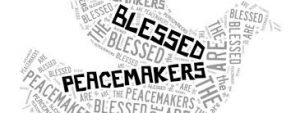
Monday 30th January, 2023
A voice from the dark called out…
Click for more
‘The poets must give us
imagination of peace, to oust the intense, familiar
imagination of disaster. Peace, not only
the absence of war.’
But peace, like a poem,
is not there ahead of itself,
can’t be imagined before it is made,
can’t be known except
in the words of its making,
grammar of justice,
syntax of mutual aid.
A feeling towards it,
dimly sensing a rhythm, is all we have
until we begin to utter its metaphors,
learning them as we speak.
A line of peace might appear
if we restructured the sentence our lives are making,
revoked its reaffirmation of profit and power,
questioned our needs, allowed
long pauses. . .
A cadence of peace might balance its weight
on that different fulcrum; peace, a presence,
an energy field more intense than war,
might pulse then,
stanza by stanza into the world,
each act of living
One of its words, each word
A vibration of light – facets
Of the forming crystal.
Denise Levertov, Making Peace
In the Gospel reading for yesterday (Matthew 5.1-12) the writer has Jesus say, ‘Blessed are the peacemakers’.
Peace is something that is made. It cannot exist without people who are prepared to make it.
Denise Levertov’s poem reminds us that peace cannot be achieved by the implementation of a formula or a set of rules. It can only come into existence through people of goodwill acting together to work out what peace looks like. It is something we live into and also make through our living.
This no doubt means that peace comes about at a cost to the makers.
This week I am thinking about what I might have to offer or give up in order to be numbered amongst the peacemakers?
Peace,
Peter+
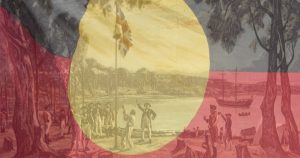
Monday 23rd January, 2023
Over the past few years some members of the Cathedral community have been part of an exercise that is seeking to explore how complexity theory might be applied to life and ministry.
Click for more
Complexity theory reminds us that we do now fully understand the systems we are living in and that we need to develop ways to notice what is emerging from our life and to be flexible enough to respond.
Our work in complexity and emergence proved to be very useful as we negotiated our way through the unknown territory created as the Covid pandemic unfolded.
Most of the tools that have emerged as complexity theory has developed have been applied to dealing with the future, seeking ways to be adaptive and respond to that which is emerging. In other words, dealing with the real world as it changes in ways we could not have predicted.
Carlos Maldonado, in an article, History and Complexity, https://www.researchgate.net/publication/264957479_History_and_Complexity , suggests that complexity theory can also be applied to the treatment of the past, that complexity tools have place in helping us process history.
It is an idea I find appealing as we approach Australia Day, a day when we become all too aware of the complexities created by the interaction of history and our current national life.
Maldonado suggests that much of the complexity we face when dealing with history is caused by the fact that emotions are involved; people with emotions. He writes:
‘History, indeed, is made by human beings, although human beings do not always act or behave as they think they do, most people act in most situations in accordance with various forces: anger, love, hate, revenge, desire, angst, etc. Emotions are the hidden force of history. The difficulty for historians is to account for these emotions in the midst of evidence and circumstances. Past actors did not always appreciate, see, or adequately evaluate and channel their reactions’.
I think that we could safely add that present actors also do ‘not always appreciate, see, or adequately evaluate and channel their reactions’.
Our emotions affect the way we hear the various stories that come to the fore as Australia Day approaches. Many of these stories can provoke feelings of anger, sadness, shame, guilt and even resentment. These emotions can take us into uncomfortable places.
Complexity theory invites us to acknowledge the place of discomfort and to move into and through it to see what might emerge. Often all that is required is to sit in the uncomfortable place and listen to the others who occupy that space with us. The listening process itself opens new opportunities for us.
This is one of the ways that the Spirit works in our complex world.
Peace,
Peter+

Monday 16th January, 2023
We have had names for you…
Click for more
The Thunderer, the Almighty
Hunter, Lord of the snowflake
and the sabre-toothed tiger.
One name we have held back
unable to reconcile it
with the mosquito, the tidal wave,
the black hole into which
time will fall. You have answered
us with the image of yourself
on a hewn tree, suffering
injustice, pardoning it;
pointing as though in either
direction; horrifying us
with the possibility of dislocation.
Ah, love, with your arms out
wide, tell us how much more
they must still be stretched
to embrace a universe drawing
away from us at the speed of light.
R S Thomas, Tell Us
In yesterday’s homily I explored the power of naming. Both Pope Benedict VI and Pope Francis chose to rename themselves as they entered their Pontificates to honour people who had inspired them, people they wished to emulate.
Many of us have had names chosen for us by lovers, friends and enemies. Sometimes the process of being renamed has borne fruit that has allowed us to flourish and become our best selves. Other times the process of being named has diminished and controlled us.
In Tell Us, R S Thomas reminds us that the names we place on God control the way we perceive God; often restricting or controlling our capacity to be in relationship with God. Images that cause us to see God a distant or angry can have destructive effects on us.
Using the name, Love, however takes us down a very different path. R S Thomas invites us not to hold back on using that name for God.
Sunday’s homily can be accessed at: https://www.stjohnscathedral.com.au/sermons/
Peace,
Peter+

Monday 9th January, 2023
Be praised, my Lord, for Sister Water…
Click for more
who is very useful to us,
and humble and precious and pure….
Francis of Assisi, Canticle of the Creatures.
Chemically water is a fascinating thing. Its molecules interact in such a way that as water freezes it becomes less dense. This is a rare characteristic amongst compounds. It is this property that causes ice to float. If ice did not float, sea beds and the bottoms of many ponds and rivers would be permanently choked by layers of ice. They would be lifeless places.
St Francis referred to Sister Water as humble, a reminder that she is the ‘ground’ on which life itself is built. Water is life.
Yesterday was the Feast of the Baptism of Jesus. Our Sister Water is the humble, precious and pure element at the heart of the baptismal experience. In the waters of baptism Jesus’ identity and personality are made manifest. He is proclaimed God’s child. Following his baptism he moves into discerning and clarifying his ministry.
As we reflect on Jesus’ Baptism we are invited to reflect on the call that comes to us through our baptism; to be grounded in an identity that links us to the heart of God and God’s loving purpose for the world. We are invited to reflect on what the gift of being alive might be asking of us.
If you have not yet been baptised this is a good week to think about exploring that possibility.
Please be in contact if you would like to explore what your baptism might be inviting you to do or to be or if you wish to explore how you might experience the joy of being baptised. One is never too old.
Peace,
Peter+

Monday 2nd January, 2023
The weather has been awful….
Click for more
The countryside is dreary,
Marsh, jungle, rock; and echoes mock,
Calling our hope unlawful;
But a silly song can help along
Yours ever and sincerely:
At least we know for certain that we are three old sinners,
That this journey is much too long, that we want our dinners,
And miss our wives, our books, our dogs,
But have only the vaguest idea why we are what we are.
To discover how to be human now
Is the reason we follow this star.
W H Auden, The Three Wise Men from For the Time Being
To discover how to be human now
Is the reason we follow this star….
Auden’s grandfather was an Anglican Clergyman. Auden himself rejected the faith as a teenager. As an adult he would return to the faith. Arthur Kirsch in Auden and Christianity, records Auden’s explanation of his return to the faith in 1939. It happened while he was seated in a German theatre in New York:
[The theater] was showing an official German newsreel celebrating the Nazi victory over Poland. (Until the United States and Germany declared war, German films could be shown freely in American theaters.) Auden was startled by the shouts of “Kill the Poles!” that rose from the audience of ordinary German immigrants who were under no coercion to support the Nazis. He told an interviewer many years later: “I wondered, then, why I reacted as I did against this denial of every humanistic value. The answer brought me back to the church.”
Yesterday we observed the Feast of The Epiphany, the portion of the Christmass story which sees the wise men visit the infant Jesus. At the heart of The Epiphany is the idea that to look at the face of Jesus is to see the face of God. This then extends to invite us to realise that to look at any human face is to see the face of God.
To see the face of God in each person is to discover our own dignity as bearers of the Divine image; it is to discover how to be human now.
Peace,
Peter+
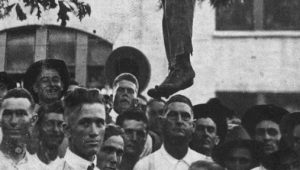
Monday 26th December, 2022
I
The coltish horseplay of the locker room,…
Click for more
Moist with the steam of the tiled shower stalls,
With shameless blends of civet, musk and sweat,
Loud with the cap-gun snapping of wet towels
Under the steel-ribbed cages of bare bulbs,
In some such setting of thick basement pipes
And janitorial realities
Boys for the first time frankly eye each other,
Inspect each others’ bodies at close range,
And what they see is not so much another
As a strange, possible version of themselves,
And all the sparring dance, adrenal life,
Tense, jubilant nimbleness, is but a vague,
Busy, unfocused ballet of self-love.
II
If the heart has its reasons, perhaps the body
Has its own lumbering sort of carnal spirit,
Felt in the tingling bruises of collision,
And known to captains as esprit de corps.
What is this brisk fraternity of timing,
Pivot and lobbing arc, or indirection,
Mens sana in men’s sauna, in the flush
Of health and toilets, private and corporal glee,
These fleet caroms, plies and genuflections
Before the salmon-leap, the leaping fountain
All sheathed in glistening light, flexed and alert?
From the vast echo-chamber of the gym,
Among the stumbled shouts and shrill of whistles,
The bounced basketball sound of a leather whip.
III
Think of those barren places where men gather
To act in the terrible name of rectitude,
Of acned shame, punk’s pride, muscle or turf,
The bully’s thin superiority.
Think of the Sturm-Abteilungs Kommandant
Who loves Beethoven and collects Degas,
Or the blond boys in jeans whose narrowed eyes
Are focussed by some hard and smothered lust,
Who lounge in a studied mimicry of ease,
Flick their live butts into the standing weeds,
And comb their hair in the mirror of cracked windows
Of an abandoned warehouse where they keep
In darkened readiness for their occasion
The rope, the chains, handcuffs and gasoline.
IV
Out in the rippled heat of a neighbor’s field,
In the kilowatts of noon, they’ve got one cornered.
The bugs are jumping, and the burly youths
Strip to the waist for the hot work ahead.
They go to arm themselves at the dry-stone wall,
Having flung down their wet and salty garments
At the feet of a young man whose name is Saul.
He watches sharply these superbly tanned
Figures with a swimmer’s chest and shoulders,
A miler’s thighs, with their self-conscious grace,
And in between their sleek, converging bodies,
Brilliantly oiled and burnished by the sun,
He catches a brief glimpse of bloodied hair
And hears an unintelligible prayer.
Anthony Hecht, The Feast of Stephen,
I thought about excising just a portion of Hecht’s poem but in the end I decided that the journey the poem takes us on is so significant that I quoted it in full.
Today is the Feast of St Stephen, the first Christian martyr. The early church made his Feast Day the day after Christmass Day to accentuate his importance to Christian story.
One of the significant aspects of the story of Stephen’s murder is the role played by the Apostle Paul. At this stage in the story Paul is known as Saul. Shortly after Stephen is killed, Saul encounters the Easter Jesus who responds to Stephen’s murder by asking Saul, ‘Why are you persecuting me?’. To persecute Stephen is to persecute Jesus, the author life. To kill Stephen is to kill Jesus.
Hecht’s poem extends this theme by suggesting us that every lynch mob’s victim is Stephen; is Jesus.
Stephen’s story reminds us that God exercises solidarity with the persecuted and the poor. The Church is called to respond by seeking to care for the persecuted and the poor and to challenge and overturn the structures that lead to persecution and poverty.
Peace,
Peter+

Monday 19th December, 2022
I was a toddler, wet-combed….
Click for more
with my pants buttoned to my shirt
and there were pink and green lights, pretty
in the day, a Christmas-tree party
up the back of the village store.
I ran towards it, but big sad people
stepped out. They said over me It’s just, like,
for local kiddies and but let him join in;
the kiddies looked frightened
and my parents, caught off guard
one beat behind me, grabbed me up
in the great shame of our poverty
that they talked about to upset themselves.
They were blushing and smiling, cursing me
in low voices Little bugger bad boy!
for thinking happy Christmas undivided,
whereas it’s all owned, to buy in parcels
and have at home; for still not knowing
you don’t make a holy show of your family;
outside it, there’s only parry and front.
Once away, they angrily softened to
me squalling, because I was their kiddie
and had been right about the holy show
that models how the world should be
and could be, shared, glittering in near focus
right out to the Sex frontier.
Les Murray, The Holy Show
Many poor families understand all too well the difficulties of negotiating Christmass with and for their children. As Les Murray notes in his poem, The Holy Show, we cultivate the idea that Christmass is for everyone, equally, while creating barriers that prevent the poor and outsiders from participating, and by kindling expectations that those without means cannot hope to meet.
Murray’s poem lifts the veil on the simplistic reading of the Christmass story which can be imposed, often unwittingly, by those privileged enough to have money and who enjoy functional family relationships.
One of the reasons why the Christmass story has proved so enduring is because it is complex and touches the lives of those who do not have privileged access to the items under the Christmass tree.
The Christmass story speaks to our human condition in its complexity. As we look beyond the romanticised images of a cute baby in a tidy, clean crib, we see a family of questionable morals, outsiders who are poor and who have cause to flee for their lives as refugees. The first Christmass was not tinsel and fruitcake for those who lived it.
To honour this complexity, we not only host services that celebrate joy and goodwill, butalso host Blue Christmass Services for those for whom Christmass is tough.
The big joyful services are incredibly important because they remind us that Christmass does model how the world should be
and could be, shared…. Blue Christmass on the other hand honours the fact that God is with us whatever our life experience.
The Cathedral will host a Blue Christmass Service on Tuesday evening at 6pm.
Peace,
Peter+
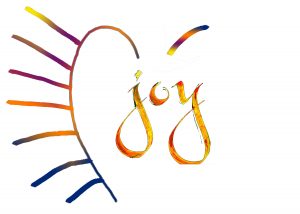
Monday 12th December, 2022
My luminary,..
Click for more
my morning and evening
star. My light at noon
when there is no sun
and the sky lowers. My balance
of joy in a world
that has gone off joy’s
standard. Yours the face
that young I recognised
as though I had known you
of old. Come, my eyes
said, out into the morning
of a world whose dew
waits for your footprint.
Before a green altar
with the thrush for priest
I took those gossamer
vows that neither the Church
could stale nor the Machine
tarnish, that with the years
have grown hard as flint,
lighter than platinum
on our ringless fingers.
R S Thomas, Luminary
R S Thomas, Welsh Anglican priest and poet, was known to be something of a grump. And yet in his poem, Luminary, he talks of joy.
Luminary reveals the deep and abiding joy Thomas experienced through being married to Elsi, his wife of 51 years. Luminary is one of cache of love poems he wrote for her that were published after his death.
It is helpful to know that a grumpy person can experience such deep joy.
That a grump can experience great joy helps us understand what joy is.
Often confused with happiness, joy is in in fact something deeper; it is visceral, a state of being rather than an emotion. Happiness comes and goes while joy is something that is more abiding. As Thomas experienced, it comes from knowing in our depths that we are loved because we are. Christianity at its best proclaims this. God loves us. Period.
In Luminary Thomas also remarks that the world has departed from Joy’s standard and thanks Elsi for being a source of joy in a joyless world. As I see it, Thomas holds that the world has departed from Joy’s standard because we have become utilitarian; we value people for what they do rather than who they are. A sure way to kill off any senses of joy. If we are ‘useless’ we have no value.
Sunday was the third Sunday in the Season of Advent. The theme for the Sunday is Joy. This week let us spread some joy by telling people we value them for who they are rather than what they do.
Peace,
Peter+

Monday 5th December, 2022
Click for more
erodes injustice,
silences social disruption,
melts hostility, greed, and vice,
stirs solidarity,
resonates love and harmony,
and advocates a free, plural world
is the power of Salam.
Kawa Kerami, The Power of Shalom
Kawa Kerami’s poem was an entered in The Poetry for Peace contest held by the UN in 2011.
Yesterday was the Second Sunday of Advent. The theme for that Sunday was Peace.
Kawa Kerami’s poem reminds us that the peace we seek is better known in the Biblical tradition as Shalom. Shalom describes the peace that arises when everyone has enough to eat, is clothed and housed in a safe environment. The peace that shalom points to is not simply the absence of war.
For shalom to come into being injustices need to be dealt with and the things that cause people to be oppressed need to be challenged.
If we desire Shalom, we need to be actively involved in transforming unjust structures. Our involvement in the 16 days of activism against gender-based violence is an example of that sort of active involvement.
Peace,
Peter+
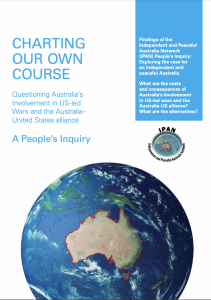
Monday 28th November, 2022
O come, O come, and be our God-with-us…
Click for more
O long-sought With-ness for a world without,
O secret seed, O hidden spring of light.
Come to us Wisdom, come unspoken Name
Come Root, and Key, and King, and holy Flame,
O quickened little wick so tightly curled,
Be folded with us into time and place,
Unfold for us the mystery of grace
And make a womb of all this wounded world.
O heart of heaven beating in the earth,
O tiny hope within our hopelessness
Come to be born, to bear us to our birth,
To touch a dying world with new-made hands
And make these rags of time our swaddling bands.
Malcolm Guite, O Emmanuel
As with the financial world and some non-western cultures, the Church year differs from the western calendar year. The Church year commences on the fourth Sunday before Christmass. The four Sundays before Christmass make up the season of Advent. This year Advent Sunday was celebrated yesterday.
Advent is a complex season, the complexity being provided by the fact that the themes it addresses include both beginnings and endings, as well as expectation, preparation and fulfillment.
One of the products of this complex of themes is that together they invite us to see that the way the world is now, is not the way it has to be; that this wounded world can become a womb for grace and love, if we seek to work with the Divine to make it a better place.
In Advent we are asked to look for signs of what God might be up to in order to make the world a place where everyone flourishes. We are also invited to join in the process of bringing to fruition the vision of what the world might be.
One of the ways we do that is to question and examine the status quo.
Last year IPAN (Independent and Peaceful Australia Network) invited me to be a panel member (Social and Community Impacts Chapter) for their Inquiry into the costs and consequences of Australia’s involvement in US led wars.
The Report was launched in Parliament House, Canberra, on Thursday 24th November. I and other panel members were in attendance.
The report invites us to challenge one aspect of our current status quo by imagining Australia’s relationships with other countries differently. The Report can be accessed here:
https://independentpeacefulaustralia.com.au/wp-content/uploads/2022/11/CHARTING-OUR-OWN-COURSE_softcopylinks.pdf
Peace,
Peter+
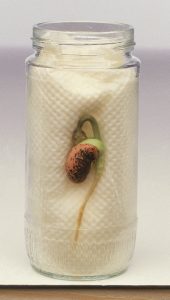
Monday 21st November, 2022
You come to fetch me from my work to-night…
Click for more
When supper’s on the table, and we’ll see
If I can leave off burying the white
Soft petals fallen from the apple tree.
(Soft petals, yes, but not so barren quite,
Mingled with these, smooth bean and wrinkled pea;)
And go along with you ere you lose sight
Of what you came for and become like me,
Slave to a springtime passion for the earth.
How Love burns through the Putting in the Seed
On through the watching for that early birth
When, just as the soil tarnishes with weed,
The sturdy seedling with arched body comes
Shouldering its way and shedding the earth crumbs.
Robert Frost, Putting in the Seed
I am fascinated by the germination and development of plants: the swelling of the seed as it absorbs moisture, the cracking of the seed coat as the young plant pushes out its root, the emergence of the cotyledons and the juvenile leaves as the plant orientates towards the light, and finally the emergence of the adult leaves.
As a child I often grew beans or peas in a jar so that I could watch the process of emergence that is otherwise hidden in the mystery of the soil.
Later in life I would study the relationship between wattle trees and the bacteria that enable them to fix nitrogen; a capacity that enables them to establish in poor and depleted soils. As part of that process I had to spend time in the bush searching for my target species.
I was constantly enthralled by the beauty and diversity of the trees and other plants.
It was the experience of being enthralled by plants, bacteria and biological processes (biochemistry) that helped me understand the idea of awe and provided the pathway for me to discover Christianity’s best kept secret, Spirituality. It was the discovery of spirituality that enabled me to both join and find my place in the church.
Opening the way for people to discover a spirituality of engagement and attentiveness, based on the experience of awe, is one of the most important things the church can be offering in our time. Western humanity desperately needs to reorientate its approach to the planet and its creatures. Being awestruck by their beauty, wonder and complexity would help us to challenge our current utilitarian and domineering approaches to this awe-inspiring place we call home.
Peace,
Peter+
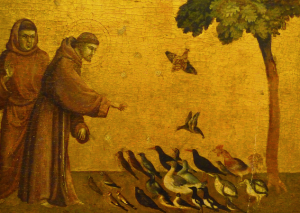
Monday 14th November, 2022
Would I might wake St Francis in you all…
Click for more
Brother of birds and trees, God’s Troubadour,
Blinded with weeping for the sad and poor;
Our wealth undone, all strict Franciscan men,
Come, let us chant the canticle again
Of mother earth and the enduring sun.
God make each soul the lonely leper’s slave;
God make us saints, and brave.
Vachel Lindsay
The Cop27 meeting in Egypt is now entering its second week.
My prayer for those present is that the Spirit of St Francis might wake in them all.
My prayer for the western world is that together we find the Spirit of Francis waking in us.
It seems to me that St Francis is the saint for our times even though he died nearly 800 years ago. He understood humanity’s relationship to the other creatures who share our common home in ways that would transform our approach to life and living should his understanding be more widely adopted.
The first week of Cop27 saw the issue of Climate compensation raised in earnest. At the heart of that cry from the poorer and more vulnerable nations was the idea that there can be no flourishing without justice. That the way forward for humanity must be paved by Climate Justice as well as justice for those affected by the lifestyle choices of the richer nations; of nations like ours.
St Francis would encourage us to see those affected by climate change as our sisters and brothers and the care for them as family. Compensation would then be seen as a sign of love and familial affection.
Francis would also extend this desire to cherish the other to the animals, birds and trees. He invites us to see the biosphere as a household and to care for it accordingly.
May Cop27 bear fruit that will make the family, as Francis understood it, flourish. May those who attend Cop27 be brave for the sake of all creatures.
Peace,
Peter+
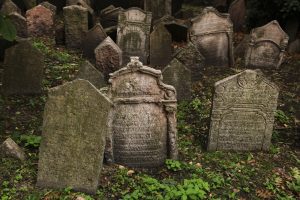
Monday 7th November, 2022
Death is nothing at all…
Click for more
It does not count.
I have only slipped away into the next room.
Nothing has happened…
So begins a poem by Henry Scott-Holland. He wrote it while working as a priest at St Paul’s Cathedral, London. It was first read while the body of Edward VII was lying in state in Westminster in 1910.
The poem, is a very popular choice at funerals and it is, in my opinion, an incredibly unhelpful addition.
I am sure Scott-Holland wanted the poem to express the Christian hope that when we die we continue on in Christ. The reason that the poem is unhelpful is because that these days it feeds into our culture’s death denying practices.
It is very rare these days to hear someone talk about death. We say that someone has ‘passed away’ or ‘passed’ rather that saying they have died; that death has taken them away from us and has destroyed the life we once knew. It is not the case that death is nothing at all.
To talk euphemistically about death and to minimise its effects by suggesting that it should be nothing to those who have to live with the aftermath of a death is an act of culturally-imposed cruelty.
The reality is that the death of a loved one is traumatising and life-shifting. Many people find that death takes away their key support person. Some are plunged into poverty as an income stream dries up. Others lose their accommodation. It is not uncommon for the grief-stricken to experience depression or other mental health effects.
To live through these effects while receiving messaging that tells us death is nothing, is to be told that we are not coping with life. I often talk with people who feel that there must be something wrong with them because they have ‘not gotten over’ the death of their spouse or a child.
In order to offer a counter-point to our culture’s unhealthy approach to death, we recently hosted a number of Death Talks. And last night we held our annual All Souls’ Day service. On All Souls’ day we do express the Christian hope that we have in Christ but we also acknowledge the reality and depth of grief that the death of our loved ones leaves us with.
We never get over the grief instead we learn to live with it. The death of a loved one changes us, therefore it cannot be said to be ‘nothing’.
The All Souls’ liturgy can be viewed here: https://youtu.be/PzFWlthdgwo
Peace,
Peter+

Monday 31st October, 2022
A person spent hours watching a butterfly struggling to emerge from its cocoon…
Click for more
It managed to make a small hole, but its body was too large to get through it. After a long struggle, it appeared to be exhausted and remained absolutely still.
The watcher decided to help the butterfly and, with a pair of scissors, cut open the cocoon, thus releasing the butterfly. However, the butterfly’s body was very small and wrinkled and its wings were all crumpled.
The person continued to watch, hoping that, at any moment, the butterfly would open its wings and fly away. Nothing happened; in fact, the butterfly spent the rest of its brief life dragging around its shrunken body and shrivelled wings, incapable of flight.
What the person – out of kindness and his eagerness to help – had failed to understand was that the tight cocoon and the efforts that the butterfly had to make in order to squeeze out of that tiny hole were Nature’s way of training the butterfly and of strengthening its wings.
Modified from a Story told be Paulo Coelho,
based on a story provided by Sonaira D’Avila
Coelho’s words encourage us to ensure that our institutions and helping agencies continue on the trajectory we have been seeking to follow over the last few years of allowing those who have a need to provide leadership in developing the response to meet that need.
Client-centred program development and delivery was one of the ideas that drove the introduction of the NDIS. More recent developments demonstrate how easily we can lose that focus.
As we move towards the referendum about the Voice to Parliament leadership by First nations people will be a key factor in ensuring that The Voice helps to address the long term diminishment of First nations people caused by the process of colonisation.
Coelho’s words also encourage us to use the catechumenal method when working with people as they undertake Christian formation and preparation for Baptism and Confirmation. The Catechetical method assumes that each newcomer brings with them a wealth or experience and insights that we can receive as gifts. We learn from them and they learn from us.
We need to keep in check the constant temptation to do ministry to others instead of seeing them as partners in the gospel and partners in the process of their own becoming.
Peace,
Peter+
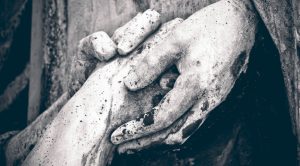
Monday 3rd October, 2022
Tomorrow is the Feast of St Francis which brings to a close The Season of Creation.
Click for more
St. Francis of Assisi had a fear and abhorrence of lepers. One day, however, he met a man afflicted with leprosy while riding his horse near Assisi. Though the sight of the leper filled him with horror and disgust, Francis got off his horse and kissed the leper. Then the leper put out his hand, hoping to receive something. Out of compassion, Francis gave money to the leper.
But when Francis mounted his horse again and looked all around, he could not see the leper anywhere. It dawned on him that it was Jesus whom he had just kissed.
https://www.franciscanmedia.org/franciscan-spirit-blog/st-francis-meets-the-leper
Reflecting on the experience, Francis wrote:
When I was in sin, the sight of lepers nauseated me beyond measure; but then God himself led me into their company, and I had pity on them. When I became acquainted with them, what had previously nauseated me became the source of spiritual and physical consolation for me.
Francis of Assisi, My Testament
This incident reminds us that Francis was the subject to ongoing conversion throughout his life and that he communed with societies outcasts as well as with the animals.
Francis invites me to embrace the process of ongoing conversion and to deepen my commitment to the poor.
Peace,
Peter+
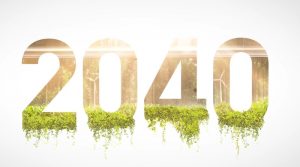
Monday 26th September, 2022
About a month ago we recorded one of our On The Way Podcasts with Damon Gameau during the Byron Bay Writers’ Festival.
Click for more
Damon was the director of the movie, 2040. More recently he has produced, Regenerating Australia. In both movies Damon looks at what we might do in response to Climate Change and ecological decline.
Damon deliberately decided to take an approach to these issues looking through the lens of hope. He did this because he realised that people who are hopeful find that they can act in the presence of threat, whereas those without hope tend to become paralysed.
He is careful to point out that he is not using hope as hopeium – clinging to unfounded hope to numb the pain of reality – but as an enabler which allows people to embrace possibility and so make a difference.
The podcast will be released in the near future. In the meantime you can access other podcasts here. Many of the podcast deal with the spirituality and practicality of living in new ways with and on this planet.
Peace,
Peter+
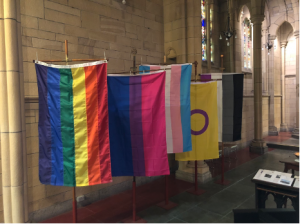
Monday 19th September, 2022
Jim Cotter was an Anglican priest in Wales….
Click for more
He was an incredible wordsmith who could capture human experience in prayer and poetry in ways that spoke to me soul. He was also a gay man and so often wrote as one living on the margins.
Yesterday we kept Pride Sunday in the Cathedral. With that frame in mind, here is piece Jim wrote as a reflection on the passage in The Book of Numbers in which the Israelites, while in the wilderness, sent spies to check out the promised land, the land flowing with milk and honey. On the spies’ return the Israelites were unwilling to enter the land despite it being a place of incredible promise (Numbers 13). Jim asks us if we are willing to enter a land of promise where all people are cherished and love celebrated?
I vow to you, my friends of earth,
all worldly things above,
Entire and whole — yet broken.— the service of my love:
The love that dares to question,
the love that speaks its name,
That flowers still in barren ground,
yet hides no more for shame:
The love that struggles through the pain
and whispers in the night,
Yet shares its secret with the world,
to bring the truth to light.
This is that other country we heard of long ago,
When called to be the spies of God where milk and honey flow:
A world where hurts find healing,
where all th’oppressed run free,
Where friends who have been sore betrayed each other truly see
It is our earth, transfigured, new,
where wars and hatreds cease,
Where spy and friend walk hand in hand in Christ our Lover’s Peace.
Peace,
Peter+
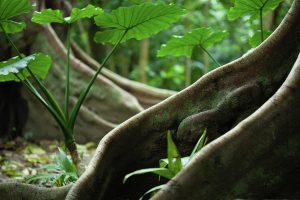
Monday 12th September, 2022
The tree which moves some to tears of joy…
Click for more
is in the eyes of others only a green thing that stands in the way. Some see nature all ridicule and deformity… and some scarce see nature at all. But to the eyes of the man of imagination, nature is imagination itself.
William Blake
There is something about being amongst other creatures that makes us feel different. It is not by accident that we seek out parks and gardens when we are in the middle of the city. The feeling of connection and belonging can shape our mood and reduce our stress.
There is much in our modern way of living that can insulate us from this life-giving sense of connection. Even the now ubiquitous use of aur conditioning in cars means that we often don’t experience the smells of the landscape as we drive through it.
During this season of creation we are invited to find ways to make sure we connect with the world of which we are a part.
Peace,
Peter+
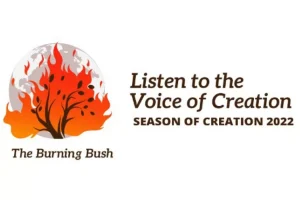
Monday 5th September, 2022
The liturgical Season of Creation commenced on Thursday.
Click for more
The Season of Creation demonstrates that the liturgy of the church can evolve to reflect the Church’s understanding of its mission.
In recent years we have come to see that we have an important role to play in not only looking after the planet but in changing human perception of the planet.
Currently we westerners tend to view the rest of ‘nature’ as ‘other’ as something from which we are separated and independent from. Because it is ‘other’ we feel that we can exploit it without consequence.
Mystics such as St Francis of Assisi help us to see the other creatures in a different light. St Francis saw them as kin, members of the same family. The concept of family conveys connection. We treat those with whom are connected in very different way to that which is seen as ‘other’.
May this unfolding season enable us to see and live differently.
Peace,
Peter+
![]()
Monday 29th August, 2022
In the idealistic approach, the leaders of an organization set out..
Click for more
an ideal future state that they wish to achieve, identify the gap between the ideal and their perception of the present, and seek to close it…
Naturalistic approaches, by contrast, seek to understand a sufficiency of the present in order to act to stimulate evolution of the system. Once such stimulation is made, monitoring of emergent patterns becomes a critical activity so that desired patterns can be supported and undesired patterns disrupted.
The organization thus evolves to a future that was unknowable in advance, but is more contextually appropriate when discovered.
Dave Snowden, Cynefin Co
Recently I had the privilege of being involved in a Retreat/Conference hosted by Cynefin Co. It was led by Dave Snowden and some of his colleagues.
We have been using the Cynefin Framework and related tools to assist us in delivering the project we are undertaking as part of the Resource Church initiative for the Diocese. Last year that project enabled a number of faith communities to begin exploring what was emerging in and for their life.
The Cathedral community has been using techniques such as Talking Circles and Open Space for a number of years as tools to help us understand who we are (what Dave refers to as coming to understand a sufficiency of the present) and to help us discern what might be emerging out of our current life. In so doing we have found ourselves living into a future that was unknowable in advance, but is more contextually appropriate. I think it has seen us flourish as a community.
In theological terms I think this way of approaching life and ministry has seen us trying to honour Rowan Williams’ description of mission. His understanding is that ‘mission is finding out what God is doing and joining in’.
Peace,
Peter+
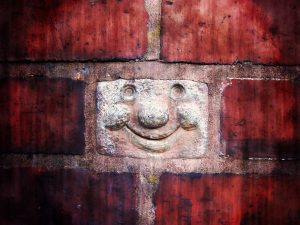
Monday 22nd August, 2022
Just these two words He spoke
changed my life…
Click for more
“Enjoy Me.”
What a burden I thought I was to carry –
a crucifix, as did He.
Love once said to me, “I know a song,
would you like to hear it?”
And laughter came from every brick in the street
and from every pore
in the sky.
After a night of prayer, He
changed my life when
He sang,
“Enjoy Me.”
Teresa of Avila, Laughter came from every brick
Through a number of mystical experiences Teresa of Avila came to know God as one who wished to be in an intimate relationship with us.
Her spirituality challenged many of the images of God that were current in her (and our day). She lived in the days when the Spanish Inquisition was at its height; forcibly converting Jews to Christianity and forbidding women to read.
The God that the inquisitors imagined was into power, control and hierarchy; an authenticator of misogyny and racism. Teresa, despite the opposition of the Church at the time, pointed to God as one who desires relationship, inspires us to love above all else and wants so much to be enjoyed that even the bricks learn how to laugh.
Peace,
Peter+
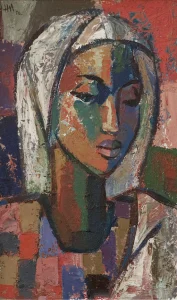
Monday 15th August, 2022
There’s a secret door in the belly of Mary,…
Click for more
hidden to most but open to all.
There is no handle.
You enter by seeking and weeping and prayer:
or by sheer serendipity.
Once inside, the space is vast and endlessly expanding.
Like the Tardis or those Russian dolls that fit inside each other,
the spaces go inwards, infinitely unfolding.
And there is not only one room, but many
Nicola Slee, The Mansion of Mary
Over the years I have become increasingly devoted to Mary, the Mother of Jesus. For me she is a symbol of powerful non-violent resistance, of bravery, wisdom and compassion; a spiritual power house who seeks to align her life with God’s commonwealth, and makes herself available to be an agent of that unfolding transformation of the world. For me she is the embodiment of being a person of faith; a mystic and an activist.
It took me quite some time to develop my Marian devotion. Seeing her for who I now know her to be was slowed by the ways in which the various parts of the church have portrayed here. In the catholic tradition she is often turned into a saccharine, docile figure; a symbol of purity and virtue, where virtue is equated with not making a fuss, being pleasant and self-sacrificing nurturer. The protestant wing of the church on the other hand largely ignores Mary, portraying her as the necessary vehicle for bearing the Christ but otherwise diminishing her role. And the idea of ‘God’s plan’ being fulfilled reduces Mary’s agency.
Over the years I have discovered the Mary who challenged societal norms and who put her body on the line to make that challenge real. I have discovered the mother whose influence made Jesus into the radical lover of people and challenger of destructive ideologies and theologies we encounter in the gospels. Her influence as parent cannot be under estimated. I suspect her mystical prayer life also formed the spirituality of Jesus. I think for him she was also an image of the compassion and love of the Divine. After all, most parents shape their children’s understanding of God in some way.
Mary’s feast day is today, Monday 15th August, so today I give thanks for her ministry and example, and with Luke (and the angel Gabriel) and countless people down the ages I say:
Hail, Mary, full of grace,
the Lord is with thee.
Blessed art thou amongst women
and blessed is the fruit of thy womb, Jesus.
Holy Mary, Mother of God,
pray for us sinners,
now and at the hour of our death.
Amen.
Peace,
Peter+
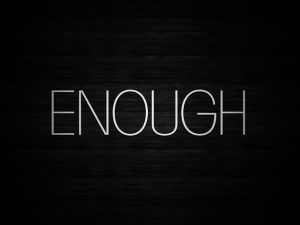
Monday 8th August, 2022
Enough. These few words are enough…
Click for more
If not these words, this breath.
If not this breath, this sitting here.
This opening to life
we have refused
again and again
until now.
Until now.
David Whyte, Enough
While The Deans of Australian Cathedrals were in Conference last week, we were invited to attend a rally called to urge the Minister for the Environment to protect the Gelorup Corridor from being cleared for the Bunbury Ring Road.
Most of the Bunbury Ring Road has been built across previously cleared land. The Gelorup Corridor is a small parcel of land that features ecosystems that support a large number of endangered species. A previously cleared alternative to the Gelorup corridor exists nearby.
We continue to clear land, most often in the parts of the country that host the greatest biodiversity, as if the supply of land is infinite. It seems that we think that if clear this or that bit of land, the birds, animals and plants will be able to move to another area. The reality is that we are running our of other bits of land, so each loss of habitat is becoming more critical. Loss of habitat was described as being one the key drivers of species loss and endangerment in the recently released State of the Environment Report.
David Whyte’s poem asks us to consider whether it might be the case that we humans have trouble knowing when we have enough and when we have taken enough. Do we know what enough is?
During the rally the Dean of Bunbury, The Very Rev’d Darryl Cotton, asked those assembled to join him in blessing the land and creatures of Gelorup. Over 90% of those present joined him in that act of goodwill towards the creatures with whom we share this planet.
Seeing the land as a precious gift and the other creatures as companions might help us realise that we have enough and that because we have enough we can leave some for the other creatures to enjoy.
Peace,
Peter+

Monday 1st August, 2022
The first thing about the angels that we ought to imitate,
is their consciousness of the Presence of God.
Jean Vianney
Click for more
Thursday is the Feast Day of Jean Vianney, the patron saint of parish priests. Vianney was the parish priest to the small parish of Ars in France from 1818 for 40 years. He was a passionate supporter of the poor and treated all people equally. He became world famous as a confessor. Those who visited him felt like he understood them as individuals.
By 1855 he was sitting in the confessional for up to 16 hours a day in order to give advice to over 20 000 people a year. People would queue for hours to spend time with him. Occasionally a noble would use their influence to skip ahead in the queue. John would greet them by sending them back to their place in the queue. It says something about his appeal that the Nobles would meekly comply. And wait their turn.
John Vianney stands as reminder that spiritual and emotional intelligence are not related to intellectual capacity. John almost failed to become a priest because his capacity for study was very limited. In fact he was sent to Ars because only 230 people lived there and the bishop considered that he would not be able to do too much damage.
Whilst he had a quick wit, in the end, he was known, not for his intelligence but, for his sensitivity to people and attentiveness to their needs and concerns. He loved his people.
Peace,
Peter+
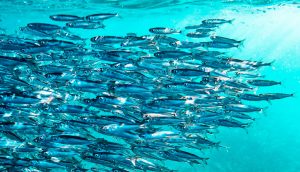
Monday 25th July, 2022
The world is charged with the grandeur of God.
It will flame out, like shining from shook foil;…
Click for more
It gathers to a greatness, like the ooze of oil
Crushed. Why do men then now not reck his rod?
Generations have trod, have trod, have trod;
And all is seared with trade; bleared, smeared with toil;
And wears man’s smudge and shares man’s smell: the soil
Is bare now, nor can foot feel, being shod.
And for all this, nature is never spent;
There lives the dearest freshness deep down things;
And though the last lights off the black West went
Oh, morning, at the brown brink eastward, springs —
Because the Holy Ghost over the bent
World broods with warm breast and with ah! bright wings.
Gerard Manley Hopkins, God’s Grandeur
Gerard Manley Hopkins was writing his poetry at the height of the Industrial Revolution. He was dismayed at the way the new factories were fouling the environment and the way in which the working and living conditions were wearing down the working class people. In God’s Grandeur he laments that humanity is degrading the beauty of the planet, the beauty that expresses God’s grandeur.
Against the backdrop of the destruction wrought by humanity Hopkins found hope in the fact that nature is never spent and that God’s presence in creation is a constant source of hope.
The latest (2021) State of the Environment Report, (https://soe.dcceew.gov.au/) which was finally released last week, demonstrates that many of Australia’s ecosystems are at the point of collapse and many species are approaching the point of extinction.
Our current situation differs from that which Hopkins encountered in that the environment in our time is subject to systemic pressures and collapse. In his time the effects tended to be more localised. So, in our time it is looking like nature might just be ‘spent’.
Hopkins and some of the other poets of his time played a pivotal role in getting people to recognise the damage that was being done to the environment. We can play a similar role by reminding our utilitarian culture that that the environment and the other creatures have value because they reflect God’s grandeur. Valued things are always protected.
Peace,
Peter+
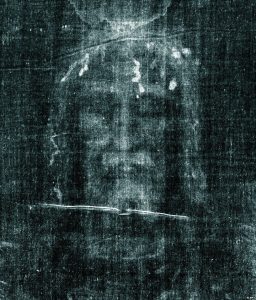
Monday 18th July, 2022
Why no! I never thought other than
That God is that great absence…
Click for more
In our lives, the empty silence
Within, the place where we go
Seeking, not in hope to
Arrive or find. He keeps the interstices
In our knowledge, the darkness
Between stars. His are the echoes
We follow, the footprints he has just
Left. We put our hands in
His side hoping to find
It warm. We look at people
And places as though he had looked
At them, too; but miss the reflection.
R S Thomas, Via Negativa
One of the readings we used in our worship yesterday included an ancient Christological hymn:
Christ is the image of the invisible God,
the firstborn of all creation;
for in him all things in heaven and on earth were created,
things visible and invisible,
whether thrones or dominions or rulers or powers
—all things have been created through him and for him.
He himself is before all things,
and in him all things hold together….
Colossians 1.15-17
The ancient author’s use of the idea that something visible can be the image of that which is invisible made me recall the way R S Thomas and other poets use similar paradoxical imagery to help us wrestle with the nature of God and even with the nature of ourselves. R S Thomas often refers to the presence of God as being like an absence; an absence that engages us.
The use of such imagery helps us to stay engaged with the mystery of the Divine, the mystery of life and the mystery being human. It is a wonderful antidote to the effects of the utilitarian culture in which we find ourselves.
Peace,
Peter+

Monday 11th July, 2022
Of all the public places, dear…
Click for more
to make a scene, I’ve chosen here.
Of all the doorways in the world
to choose to sleep, I’ve chosen yours.
I’m on the street, under the stars.
For coppers I can dance or sing.
For silver-swallow swords, eat fire.
For gold-escape from locks and chains.
It’s not as if I’m holding out
for frankincense or myrrh, just change.
You give me tea. That’s big of you.
I’m on my knees. I beg of you.
Give, Simon Armitage
On Sunday of last week, 21 members of our community, along with few members of the wider public, met in a talking circle to explore the Cathedral’s ministry with the rough sleepers who find themselves on the Cathedral precinct each night.
The Circle was called as part of an action plan that arose out of our Visioning Day in June.
During the Circle we reflected on the question, how has my life been touched by the homeless? Answers to this question revealed that some in our community live on the edge of, and with the fear of becoming, homelessness; others talked of transformative encounters and of being challenged, and of being gifted with insights into life and living through their encounters with rough sleepers.
Homelessness is produced by the interplay of a large number of policy settings, societal attitudes, personal life experience and access to services.
The Circle did not solve the problem but created a closer knit group of people who are determined to be part of the solution.
Peace,
Peter+
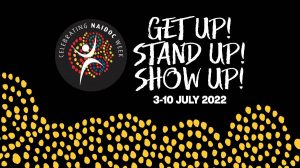
Monday 5th July, 2022
Get Up! Stand Up! Show Up!
Click for more
This week is NAIDOC Week.
NAIDOC Week exists to celebrate and recognise the history, culture and achievements of Aboriginal and Torres Strait Islander peoples.
This year’s theme, Get Up! Stand Up! Show Up!, is a call to action. In the first instance, the theme is intended to encourage Aboriginal and Torres Strait people to be active in bringing about the changes needed to ensure that proper environmental, cultural and heritage protections are developed, Constitutional change is achieved and there is a comprehensive process of truth-telling, that will help the nation move towards developing treaties, and ending racism.
The NAIDOC Committee hopes that living into the theme will help our nation move beyond the potential tokenism of acknowledgement, and bring about more than good intentions.
They write, ‘The relationship between Aboriginal and Torres Strait Islander peoples and non‑Indigenous Australians needs to be based on justice, equity, and the proper recognition of Aboriginal and Torres Strait Islander peoples’ rights.’
For this to be achieved, those of us who are not First Nation’s Peoples are also going to Get Up! Stand Up! And Show Up!
The challenge for us will be to do that in such a way that will honour the leadership of Aboriginal and Torres Strait Islander peoples in the process. We need to be present as sensitive allies.
The Church was one of the agents of colonisation and so can have an important role to play, if we attend sensitively, in the healing process.
Peace,
Peter+
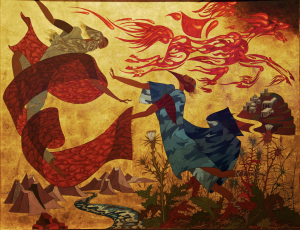
Monday 27th June, 2022
And did those feet in ancient time…
Click for more
Walk upon Englands mountains green:
And was the holy Lamb of God,
On Englands pleasant pastures seen!
And did the Countenance Divine,
Shine forth upon our clouded hills?
And was Jerusalem builded here,
Among these dark Satanic Mills?
Bring me my Bow of burning gold:
Bring me my arrows of desire:
Bring me my Spear: O clouds unfold!
Bring me my Chariot of fire!
I will not cease from Mental Fight,
Nor shall my sword sleep in my hand:
Till we have built Jerusalem,
In Englands green & pleasant Land.
William Blake
The Old Testament readings on Sundays from 1 Kings are certainly providing us with some stunning imagery. Last week it was The Still Small Voice, this week it is The Chariots of Fire.
William Blake takes up The Chariots of Fire image in the poem known as Jerusalem.
In 1916 Blake’s poem was set to music by Sir Hubert Parry (orchestrated by Sir Edward Elgar) to become the well-loved hymn.
By 1916 the reality of the First World War, with its daily unimaginable carnage, was beginning to take hold of the psyche of the people of the UK, so the hymn was used as a rallying cry.
The hymn was used to suggest that the war, as horrible as it was, would provide the opportunity for the people of the UK to build the New Jerusalem; that out of the costly destruction of the war a new, more just, less class-ridden and poverty-riven society would emerge. In the process, the dead were given that now familiar gloss of being called ‘glorious’.
Significant numbers of people embraced the vision of building the New Jerusalem out of the rubble as a way of surviving the war.
After the war many experienced profound disappointment when the New Jerusalem did not appear. This feeling of disappointment was exacerbated by the fact that the very people who had promulgated the vision of the New Jerusalem during the war – political, military and church leaders – worked to ensure that the vision did not come to pass. Casting the vision of the New Jerusalem was nothing but a cynical exercise.
When William Blake wrote his poem he genuinely held to the idea that it was possible to build the New Jerusalem.
Like the people of the UK during and after the war, we too are often victims to the cynical machinations of those who wield power and influence. As disheartening as that is, we should not allow ourselves to be distracted from trying to build a better world.
Peace,
Peter+
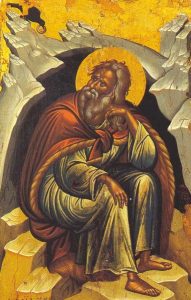
Monday 20th June, 2022
I emerge from the mind’s
cave into the worse darkness…
Click for more
outside, where things pass and
the Lord is in none of them.
I have heard the still, small voice
and it was that of the bacteria
demolishing my cosmos. I
have lingered too long on
this threshold, but where can I go?
To look back is to lose the soul
I was leading upwards towards
the light. To look forward? Ah,
what balance is needed at
the edges of such an abyss.
I am alone on the surface
of a turning planet. What
to do but, like Michelangelo’s
Adam, put my hand
out into unknown space,
hoping for the reciprocating touch?
R S Thomas, Threshold
In the poem Threshold R S Thomas picks up some of the imagery we encountered in the first reading (1 Kings 19.1-4, 8-15a) at the Eucharist on Sunday. That reading contains the story of Elijah encountering God as a still small voice rather than as force revealed in a whirlwind, in an earthquake, or in fire.
He reminds us that if God is coming to us as a still small voice, on occasion we need, in faith, to reach into the unknown.
Peace,
Peter+
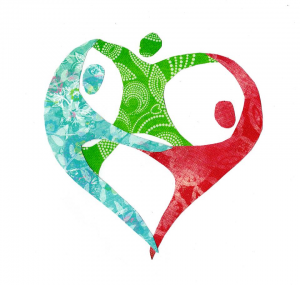
Monday 13th June, 2022
Choreography suggests the partnership of movement…
Click for more
symmetrical but not redundant,
as each dancer expresses and at the same time fulfills
him/herself towards the other.
In interaction and inter-course,
the dancers (and the observers) experience one fluid motion of encircling, encompassing, permeating, enveloping, outstretching.
There are neither leaders nor followers in the divine dance,
only an eternal movement of reciprocal giving and receiving,
giving again and receiving again…
The divine dance is fully personal and interpersonal,
expressing the essence and unity of God.
The image of the dance forbids us to think of God a solitary
Catherine Mowry LaCugna, God for Us: The Trinity and Christian Life.
On Sunday we celebrated the Feast of the Trinity, the celebration of God being Father, Son and Holy Spirit; Source of all being Eternal Word and Holy Spirit.
Over the past few years there has been an increased interest in exploring how the term, Perichoresis (Dance), can help us to appreciate the nature of the relationships between the three persons of the Trinity and their relationships with the rest of creation. Catherine LaCugna captures some of the import of this.
She reminds us that we too are caught up in the dance of creation, a dance that began as a dance of the three persons but which, through its very nature caused the rest of everything to be created and sustained. The image of the dance prevents is from holding to a static view of God and helps us to see everything as the product of relationship.
In an increasingly divided world, the idea of relationship and dancing being at the heart of being is both encouraging and transformational.
Peace,
Peter+
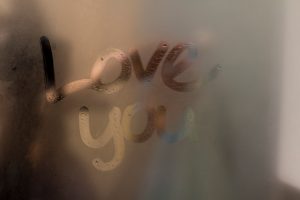
Monday 6th June, 2022
It’s a long way off but inside it…
Click for more
There are quite different things going on:
Festivals at which the poor man
Is king and the consumptive is
Healed; mirrors in which the blind look
At themselves and love looks at them
Back; and industry is for mending
The bent bones and the minds fractured
By life. It’s a long way off, but to get
There takes no time and admission
Is free, if you will purge yourself
Of desire, and present yourself with
Your need only and the simple offering
Of your faith, green as a leaf.
R S Thomas, The Kingdom
R S Thomas’ poem, The Kingdom, came to mind as I was reflecting on the theme for the Cathedral Visioning Day to be held on Saturday.
At times the transformation of the world that Jesus worked towards also can seem a long way off. We still have way too many people whose bodies and minds have been ‘fractured by life’. And there are way too many who don’t care about what happens to others.
Jesus held fast to his vision of what might be and worked towards it one encounter at a time.
We can take heart from and emulate his methodology.
The question before us on Saturday will be how we can be a source of hope and transformation in this topsy turvey world?
Little things can make difference as we seek to be part of Jesus’ commonwealth on earth. In the end for me it comes down to building a community in which people can have the experience of looking at this place and the people in it and finding that ‘love looks at them back’
Please do join us on Saturday.
Peace,
Peter+

Monday 30th May, 2022
Look up, my people…
Click for more
The dawn is breaking
The world is waking
To a bright new day
When none defame us
No restriction tame us
Nor colour shame us
Nor sneer dismay.
Now brood no more
On the years behind you
The hope assigned you
Shall the past replace
When a juster justice
Grown wise and stronger
Points the bone no longer
At a darker race.
So long we waited
Bound and frustrated
Till hate be hated
And caste deposed
Now light shall guide us
No goal denied us
And all doors open
That long were closed.
See plain the promise
Dark freedom-lover!
Night’s nearly over
And though long the climb
New rights will greet us
New mateship meet us
And joy complete us
In our new Dream Time.
To our fathers’ fathers
The pain, the sorrow;
To our children’s children
the glad tomorrow.
Oodegeroo Noonuccal (Kath Walker), A Song of Hope
Oodegeroo Noonuccal wrote that poem in the 1960’s after noticing that the attitudes held by the non-indigenous population towards First Nation’s people was changing. She saw signs of hope.
This week as we observe Reconciliation Week we note that the journey towards the hope-filled future Oodegeroo looked forward to has been, and continues to be, long and slow.
We too can see signs of hope. The Government has pledged to implement the vision captured in The Statement from the Heart.
To contribute to this movement forward, The Cathedral Council has requested that we move the Acknowledgment of Country from a written piece in Service Notes to a spoken acknowledgement at the beginning of each service.
We are also exploring ways to develop and enact our own Reconciliation Action Plan.
Peace,
Peter+

Monday 23rd May, 2022
When despair for the world grows in me….
Click for more
and I wake in the night at the least sound
in fear of what my life and my children’s lives may be,
I go and lie down where the wood drake
rests in his beauty on the water, and the great heron feeds.
I come into the peace of wild things
who do not tax their lives with forethought
of grief. I come into the presence of still water.
And I feel above me the day-blind stars
waiting with their light. For a time
I rest in the grace of the world, and am free.
Wendell Berry, The Peace of Wild Things
St John’s is currently hosting an exhibition celebrating the rich diversity of the Toondah Harbour wetlands. The exhibition is also intended to draw attention to the threat the wetlands face from a proposed development.
Toondah Harbour wetlands are located in Moreton Bay, and are currently protected under the Ramsar Convention. The Ramsar Convention seeks to ensure that wetlands are protected and cared for. Many wetlands, including the Toondah Harbour wetlands, play an important role in the life cycle of migratory birds. One species of particular note found in the Toondah wetlands is the critically endangered Far Eastern Curlew.
The proposed development by Walker Corporation would involve dredging and drying out about 40 hectares of the Ramsar-listed wetlands.
One of the simple solutions we have applied for centuries to the complexities of living on this planet has been to clear, drain or flood land as if such a practice was without consequence. This has been driven by the simple and erroneous assumptions that the supply of land is limitless and that if it isn’t being used for a human-centred purpose it is going to waste. We are beginning to see that this approach to land is not so much a problem solver as a problem exacerbator.
Sometime soon we are going to have to reorientate ourselves.
The church has something to offer is this space. The relational spirituality of St Francis of Assisi offers us a way forward.
Peace,
Peter+
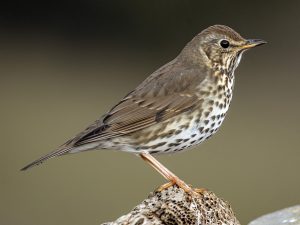
Monday 16th May, 2022
During General Synod last week one of the motions sought to celebrate the relationships of LGBTIQ+ people….
Click for more
I referred to it in the weekly update I provided on Saturday.
By the time we got to that motion the Synod was pressed for time so the President of Synod allowed just a few a speakers for and against. I was planning to speak but did not make the cut.
Had I been given the chance to speak I was planning to read the poem, Luminary, by R S Thomas:
My luminary,
my morning and evening
star. My light at noon
when there is no sun
and the sky lowers. My balance
of joy in a world
that has gone off joy’s
standard. Yours the face
that young I recognised
as though I had known you
of old. Come, my eyes
said, out into the morning
of a world whose dew
waits for your footprint.
Before a green altar
with the thrush for priest
I took those gossamer
vows that neither the Church
could stale nor the Machine
tarnish, that with the years
have grown hard as flint,
lighter than platinum
on our ringless fingers.
R S Thomas, Luminary
I thought of using the poem rather than making a more regular speech because sometimes a poet can make a clearer point than any constructed argument. I wanted the poet to speak to the idea that God blesses what God blesses and that the Church cannot stale that blessing by refusing to bless that which is good.
In the end it is the fruits of the blessed thing that reveal if that something is a really a blessing or not.
So, I would contend that on the many occasions that the church has blessed warships serving the purposes of despots, as The Russian Orthodox Church has in recent months, that God has not added an amen to the Church’s prayer. While in the case of the relationships enjoyed by LGBTIQ+ people, God has been offering a blessing, a blessing recognised by those in the relationships and those who benefit from the love they contain, despite the church’s denial to join God in that act of blessing.
The Church can be a dispenser of Grace but it is not the only one. And when it chooses to withhold a blessing on that which is good the blessings will flow through other sources. Sometimes even a thrush will be called upon to replace a priest.
Peace,
Peter+
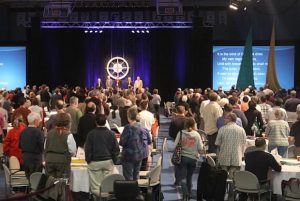
Monday 9th May, 2022
This week a number of us are taking part in a meeting of the General Synod of The Anglican Church of Australia….
Click for more
Synods are a gift in that they allow representatives from the church to come together to discuss and shape the future of the church and to shape its mission. There are not many churches that have such a structure, particularly one like ours that gives the laity such a significant role in determining the mind of Christ for the Church. The fact that we have synods at all is envied by many in other church traditions.
That said, there is much in the way that we conduct Synods that could be improved upon.
When they were first introduced in the nineteenth century, Synods were modelled on the Westminster parliamentary model, the model that is followed in the State and Federal parliaments of this country.
The advantage of such a structure is that it ensures that the business is engaged with in an orderly way . Everyone can know the rules.
The disadvantage of following the parliamentary model is that all issues have to be treated as binaries. The use of resolutions means that one has to be in favour or against a proposal. And the character of the conversations, by necessity, takes the form of a debate.
This binary framing means that Synods are not well equipped to deal with complexity or with evolution, and their life can be subject to lobbying, caucusing and campaigning. That approach is not, therefore conducive, to hearing what the Spirit is saying to church in and through the conversation.
Our Brisbane Synod has gone some way to addressing this shortcoming built in to the synodical process by having times when the members of Synod engage in dialogue through the use of Talking Circles and Open Space events.
When this meeting of General Synod was first scheduled for 2020, it was understood that the Synod would be dealing with complex issues around the future of marriage and human sexuality. Back then the organisers had planned for the Synod to engage in Open Space before it entered into debate. For some reason known only to themselves, the organisers did away with that opportunity as they prepared for us to meet this week.
My sense is that the church will be much poorer and quite a number of people will be hurt by the fact that we have not had the opportunity to be in dialogue.
So please pray for us as we enter this synod and pray for the church that it might find a way to be a life-giving and transformative presence in the world.
Peace,
Peter+
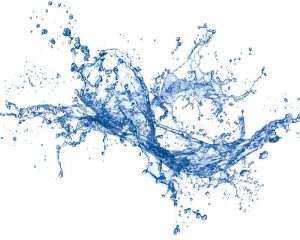
Monday 2nd May, 2022
If I were called in
To construct a religion…
Click for more
I should make use of water.
Going to church
Would entail a fording
To dry, different clothes;
My liturgy would employ
Images of sousing,
A furious devout drench,
And I should raise in the east
A glass of water
Where any-angled light
Would congregate endlessly.
Water, Philip Larkin
Philip Larkin fascinates me.
During his life he didn’t have much time for religious practice and yet some of his poetry captures deep religious truths.
His poem, Church Going, describes the importance of having buildings set aside for use by anyone who needs a place ‘to be’.
The poem I quoted above, Water, captures baptismal imagery in a most unorthodox, but compelling way.
When he died he left a substantial portion of his estate to St Paul’s Cathedral, London, which he saw as a blessing to humanity.
People like Larkin remind me that religion at its best is an expression of something that is deeply embedded in the human person. There seems to be an innate spirituality that has its origins in and expresses our essential humanity; which bubbles up when we get in touch with the source of our being.
For me this helps to explain why the use of water is to be found in a wide range of religious practices and why buildings like St Paul’s in London, and St John’s here in Brisbane, draw into a prayerful stillness people who claim to have no faith.
Peace,
Peter+

Monday 25th April, 2022
Click for more
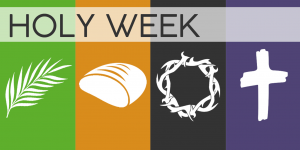
Monday 11th April, 2022
Here at the centre everything is still…
Click for more
Before the stir and movement of our grief
Which bears it’s pain with rhythm, ritual,
Beautiful useless gestures of relief.
So they anoint the skin that cannot feel
Soothing his ruined flesh with tender care,
Kissing the wounds they know they cannot heal,
With incense scenting only empty air.
He blesses every love that weeps and grieves
And makes our grief the pangs of a new birth.
The love that’s poured in silence at old graves
Renewing flowers, tending the bare earth,
Is never lost. In him all love is found
And sown with him, a seed in the rich ground.
The Stations of the Cross,
XIV Jesus is Laid in the Tomb,
Malcolm Guite
Yesterday we began the most intense week of the Christian Calendar. We call it Holy Week.
The story of Holy Week and Easter is the story that captured the imagination of each of the four gospel writers. The story of this week takes up the lion’s share of each Gospels. It covers the time between Jesus’ entrance into Jerusalem on Palm Sunday to his resurrection on Easter Day.
Holy Week is recorded in such detail by the gospel writers that we are able to recreate it:
Palm Sunday on Sunday,
The Last Supper on Thursday night,
Jesus’ trial and execution on Friday,
A day of waiting on Saturday,
The celebration of Easter joy at dawn.
We hold services to mark each of those steps in the journey; a journey that takes us on a roller-coaster ride of emotion: hope and celebration, tension and anguish, intimacy and foreboding, betrayal and fear, deep grief, confusion and transforming joy.
It is a very powerful thing to immerse oneself into every aspect of the journey through Holy Week. I think it is something that every Christian should give themselves over to completely at least once.
Come to everything and experience how it can transform you.
Peace,
Peter+

Palm Sunday 10th April, 2022
Here war is simple like a monument….
Click for more
A telephone is speaking to a man;
Flags on a map assert that troops were sent;
A boy brings milk in bowls. There is a plan
War is simple like a monument…
W H Auden’s poem, Here War Is Simple, reminds us that we slip into war too easily. Picking or taking up a fight seems to be a quick fix. Like a monument with its sharp, clean lines, war seems to be straight forward.
Putin thought his war, his invasion of Ukraine, would be like a monument.
In March 2003, when they embarked on their war on the non-existent weapons of mass destruction, against the will of the people, Bush, Howard, and Blair thought their war would be like a monument. So simplistic and unrealistic was the thinking, that on May 1 that year, Bush stood on the deck of a US aircraft carrier and declared “Mission Accomplished” in Iraq. If peace was any part of that mission, then the mission is still far from being accomplished. Two decades on.
The fact that Bush was addressing troops who were fighting in Afghanistan makes his simplistic declaration sound even more absurd, given the legacy of suffering that has been left behind in that country.
The reality of war or any conflict is anything but simple.
For living men in terror of their lives,
Who thirst at nine who were to thirst at noon,
And can be lost and are, and miss their wives,
And, unlike an idea, can die too soon.
As Auden notes, when we add the human dimensions, war is always a source of terror.
The ripples go on for generations.
Putin’s simple war, in just over a month, has redefined international relations, disrupted the world economy, is likely to destabilise life and politics in Russia, and has created the most significant refugee crisis Europe has seen since World War II.
The Bush-Howard-Blair war, built on a lie, gave birth to ISIS, has seen the terror alert in many nations, including Australia, remain higher than before, seen a crackdown on freedoms at home, left a trail of damaged returned service personnel, continues to create waves of refugees, and will have a destabilising effect on the Middle East for generations to come.
As we observe Palm Sunday, a day associated with the pursuit of peace, we do well to pause and reflect on the cost of war and the cost of pursuing simplistic approaches to the other problems we face in these complex days.
First there is the incalculable cost in terms of human misery: the direct suffering of those who live in war zones, the ongoing effects on those who fought, the intergenerational trauma experienced by their families, the lasting effects on people who have been displaced, and those who starve in the aftermath.
Then there are the environmental costs. These include the land poisoned or degraded by the processes of war – think depleted uranium, burning oil wells and agent orange. Huge amounts of carbon emissions are generated by the process of war and by the subsequent rebuilding process. The Pentagon is the world’s largest consumer of fossil fuels. Even in peace time the military consumes huge amounts of fuel and so is compounding climate change.
Climate Change, in turn, is likely to cause instability that will make conflict more likely. It is widely accepted that the Syrian Civil War was caused in part by a Climate Change induced drought. Estimates suggest that climate driven changes in water distribution could lead to 1 billion people being displaced over the next few decades. Armament manufactures are seeing this instability as an opportunity.
One of the sad realities of war is that those who lead us into it are not the ones who pay the price. In fact, quiet often they cynically use it to further short-term political goals.
So, the mothers of Russia are incensed that their conscripted sons have been compelled to fight and told lies about what they were doing, while Putin continues to make tough pronouncements.
In the days leading up to the invasion of Iraq Australians marched in their tens of thousands to decry the prospect of war, while elements of the press beat the drums of war and politicians told us lies.
So simplistic is the approach to war in this country and many others that leaders can start or join a war without the decision being subject to scrutiny or accountability. So, the US President as Commander in Chief can order the US forces to go anywhere and do just about anything. Here the Prime Minister acts in much the same way. Some parliamentarians tried to scrutinise the decision to invade Iraq, but the decision had already been taken.
Currently, our deepening involvement in the Ukrainian crisis is occurring without any scrutiny.
Given the consequences of war making, one the most serious of human exploits, we, the people, should be demanding that all future military involvement be at least subjected to a parliamentary vote.
And on Palm Sunday we need to ask why it is, when war always produces so much that is diabolical and long-lasting, that we continue to refuse to give peace-making a chance.
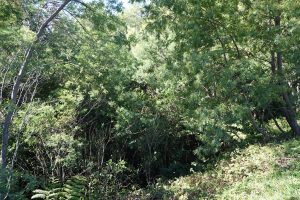
Monday 4th April, 2022
While I was studying microbiology….
Click for more
I became highly sensitised to the host plants of the bacteria I was studying. I could recognise individual plants of the various host species even from a fast moving train. Over time I developed a capacity to notice the subtle changes in biodiversity while moving through areas of vegetation, particularly as one moved around or over a mountain. As one moved, the aspect with reference to the sun changed and so did the mix of plant species; sometime dramatically.
I only recognised how significant this gift was, when after a whole day of bush walking, I asked a friend who had accompanied a group of us for the first time, what he made of the changing scenery. He responded that he had not noticed any changes and that the ceaseless scenery of trees had been rather boring.
His comments made me realise that through my work I had been given a new way to see.
One of the purposes of spiritual practices is to give us a gift similar to that given to me by my study. Meditation, prayer, contemplation and worship are intended to give us new and different ways of seeing the world.
Peace,
Peter+
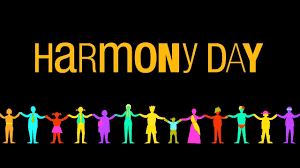
Monday 28th March, 2022
Here war is simple like a monument….
Click for more
A telephone is speaking to a man;
Flags on a map assert that troops were sent;
A boy brings milk in bowls. There is a plan
For living men in terror of their lives,
Who thirst at nine who were to thirst at noon,
And can be lost and are, and miss their wives,
And, unlike an idea, can die too soon.
But ideas can be true although men die,
And we can watch a thousand faces
Made active by one lie:
And maps can really point to places
Where life is evil now:
Nanking. Dachau.
W H Auden, Here War Is Simple
war is simple like a monument…
Auden’s poem reminds us that we slip into war too easily. Picking or taking up a fight seems to be a quick fix. Like a monument with it sharp, clean lines, war seems to be straight forward. Putin thought his war would be like a monument.
But the reality of war or any conflict is anything but simple. When we add the human aspects it always becomes a source of terror. The ripples go on for generations.
The same can be said for the conflicts that we mount in families.
One lie can sustain a conflict for decades.
Some involved in public discourse delight in stirring up conflict, often for cynical short-term gains, or to please a small group of electors. Or to stir up fear. The effects however are long-term.
Monday of last week was Harmony Day.
Our quest for harmony needs to be robust if we are to counter such destructive forces.
Harmony is much more than a romantic concept, it is the way to counter evil.
Peace,
Peter+
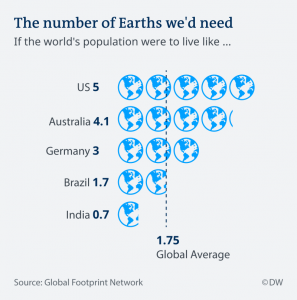
Monday 21st March, 2022
Like Christmas or Black Friday…
Click for more
the minister of the environment addressed the nation
with cowboy economy codes
at the coffee hour
he urged the spaceship spinning
with tetrapak histories
watching from LED screens
non-soluble, to follow another axis.
It does happen every year
he said, X marks the day
we grew more gold
in the croplands
thank we could eat
milked cooking oil
from shifted plates
left bruised crusts, continental
levels of polymer
replaced with synthetic kingdoms
of packaging, one-time use
for sunlight and water
industrializing air
for supermarket conveniences
stirring radioactive profit graphs
into salt, and forests
with laminated carbon bars.
Our footprints fuel
a legacy of anthropocene fossils
leaving crushing doubts
as to weather, how many earths
will spin for consumer fashion
wither a year leaps
before the next overshooting.
Mrinalini Harchandrai, Earth Overshoot Day
Wednesday will be Australia’s Overshoot Day for 2022.
Overshoot Day is the day in the year when a full year of the Earth’s regenerative output is consumed by humanity. The human family as whole consumes a year’s worth of the Earth’s production by late July. This means that from August until New Year, humanity lives by using up The Earth’s ‘capital’. Year by year we are therefore depleting The Earth.
Australians consume the planet’s resources at a much higher rate than most of humanity. We reach our Overshoot Day in March. Australians are consuming the planet four times faster than it can regenerate.
The policies that both major parties are taking to the election are inadequate both for dealing with Climate Change and for winding back overshoot. As we observe Australia’s Earth Overshoot Day, let us demand of them something better. Something better for the planet and better for our kids to whom they most definitely owe a duty of care.
Mrinalini Harchandrai’s poem can also be accessed here, should you wish to share it on Social media:
https://youtu.be/j3m3XOhryKw
Peace,
Peter+
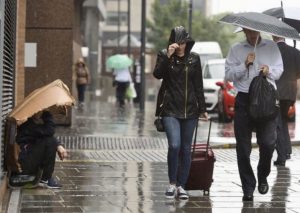
Monday 14th March, 2022
When Jesus came to Golgotha, they hanged Him on a tree…..
Click for more
They drove great nails through hands and feet, and made a Calvary;
They crowned Him with a crown of thorns, red were His wounds and deep,
For those were crude and cruel days, and human flesh was cheap.
When Jesus came to Birmingham, they simply passed Him by.
They would not hurt a hair of Him, they only let Him die;
For men had grown more tender, and they would not give Him pain,
They only just passed down the street, and left Him in the rain.
Still Jesus cried, ‘Forgive them, for they know not what they do,’
And still it rained the winter rain that drenched Him through and through;
The crowds went home and left the streets without a soul to see,
And Jesus crouched against a wall, and cried for Calvary.
Indifference, G A Studdert Kennedy
There is a subtle but sinister form of ‘prosperity theology’ infecting our public discourse at present. It manifests most often as a call to exercise ‘personal responsibility’.
At first glance this seems like a reasonable call. Afterall, being personally responsible is part of being an adult, and it is one of the ways that we show respect to others. We behave responsibly and respectfully towards them.
The toxic edge that comes with some of the current manifestations is that ‘personal responsibility’ is being pushed into areas, which in order to be fruitful, require corporate responsibility; shared practice driven by communitarian values and aims. Achieving these often requires governments and politicians to do the things they are elected to do.
A simple example was seen at play in the call to do away with ‘mask mandates’ while advocating that individuals should take ‘personal responsibility’ to protect themselves. The fact that this was nonsense was revealed by the surges in Covid-19 infections that occurred in the parts of Australia and in places across the world where the idea was peddled. Some of the comments made about flood victims recently have been just as cruel and equally misguided. It turns out that the rich are better able to exercise ‘personal responsibility’.
The wider implications of the current ‘personal responsibility’ push are unmasked by G A Studdert Kennedy’s poem, Indifference. The problem it unmasks is that ‘personal responsibility’ is being conflated with self-sufficiency. This ignores the fact that we are interconnected and that illness and tragedy can befall the most ‘responsible’ person.
Once again we hear of victims being blamed for their plight.
The number of homeless on our streets, and sleeping on the Cathedral precinct, is increasing and sadly the ‘personal responsibility’ push sees many in our society thinking that it is there problem to deal with. And so as a society we ‘pass down the street leaving them in the rain’, leaving them to exercise ‘personal responsibility’.
Peace,
Peter+
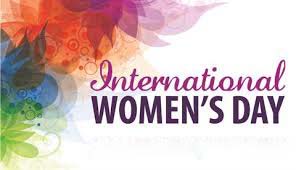
Monday 7th March, 2022
Fashionable women in luxurious homes,…
Click for more
With men to feed them, clothe them, pay their bills,
Bow, doff the hat, and fetch the handkerchief;
Hostess or guest, and always so supplied
With graceful deference and courtesy;
Surrounded by their servants, horses, dogs, —
These tell us they have all the rights they want.
Successful women who have won their way
Alone, with strength of their unaided arm,
Or helped by friends, or softly climbing up
By the sweet aid of ‘woman’s influence’;
Successful any way, and caring naught
For any other woman’s unsuccess, —
These tell us they have all the rights they want.
Religious women of the feebler sort, —
Not the religion of a righteous world,
A free, enlightened, upward-reaching world,
But the religion that considers life
As something to back out of! — whose ideal
Is to renounce, submit, and sacrifice,
Counting on being patted on the head
And given a high chair when they get to heaven, —
These tell us they have all the rights they want.
Ignorant women — college-bred sometimes,
But ignorant of life’s realities
And principles of righteous government,
And how the privileges they enjoy
Were won with blood and tears by those before —
Those they condemn, whose ways they now oppose;
Saying, ‘Why not let well enough alone?
Our world is very pleasant as it is,’ —
These tell us they have all the rights they want.
And selfish women, — pigs in petticoats, —
Rich, poor, wise, unwise, top or bottom round,
But all sublimely innocent of thought,
And guiltless of ambition, save the one
Deep, voiceless aspiration — to be fed!
These have no use for rights or duties more.
Duties today are more than they can meet,
And law insures their right to clothes and food, —
These tell us they have all the rights they want.
And, more’s the pity, some good women, too;
Good conscientious women, with ideas;
Who think — or think they think — that woman’s cause
Is best advanced by letting it alone;
That she somehow is not a human thing,
And not to be helped on by human means,
Just added to humanity — an ‘L’ —
A wing, a branch, an extra, not mankind, —
These tell us they have all the rights they want.
And out of these has come a monstrous thing,
A strange, down-sucking whirlpool of disgrace,
Women uniting against womanhood,
And using that great name to hide their sin!
Vain are their words as that old king’s command
Who set his will against the rising tide.
But who shall measure the historic shame
Of these poor traitors — traitors are they all —
To great Democracy and Womanhood!
The Anti-Suffragists, Charlotte Anna Perkins Gilman
Charlotte Anna Perkins Gilman’s poem expresses a deep frustration, the frustration and anger that comes when one realises that the advancing of a cause one cares about is being inhibited by people one feels should be onside.
Tomorrow is International Women’s Day. It is widely held that achieving equality for women is still about 100 years away. It is astonishing that achieving something so basic can still be so far off. It is already 130 years since Charlotte Anna Perkins Gilman wrote her poem.
The celebration of International Women’s Day brings into focus the unique challenges churches and other faith communities face.
Most faith traditions speak of the pursuit of justice and proclaim that human flourishing is one of the reasons they exist. And yet because of faith communities tendency to see the way things are as being divinely ordained, we fall for the trap of thinking that past injustices and previous cultural norms are part of the divine order. Churches fell into this trap when slavery was being challenged. Many still justify the subordination of women in this way.
Charlotte Anna Perkins Gilman invites us to ensure that the expression of our religion is:
The religion of a righteous world,
A free, enlightened, upward-reaching world…
a religion that follows the one who proclaims that we exist to set the captives free.
Peace,
Peter+
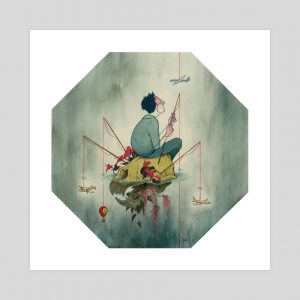
Monday 28th February, 2022
No man is an island,…
Click for more
Entire of itself,
Every man is a piece of the continent,
A part of the main.
If a clod be washed away by the sea,
Europe is the less.
As well as if a promontory were.
As well as if a manor of thy friend’s
Or of thine own were:
Any man’s death diminishes me,
Because I am involved in mankind,
And therefore never send to know for whom the bell tolls;
It tolls for thee.
John Donne
Any one’s death diminishes me,
Because I am involved in humanity….
This poem by John Donne is one I keep coming back to. I think it carries such weight for me because it stands as a corrective to our culture’s tendency to isolate us one from another.
One of the challenges we face is learning how to imaginatively use the tension created by trying to hold on to our identity as individuals while also coming to terms with the fact that our identity is also the product of our relationships; we form and deform one another.
Further complexity is added by the fact that we each have rights as individuals, which not only press against the rights of others, but are also nestled into a complex of rights that protect our life in common.
Add to this the fact that we are told that we matter, and yet many of us know what it is like to be treated as expendable by the demands of the wider society.
During the COVID pandemic we have seen so many of these tensions being highlighted.
Many parts of the Christian tradition offer access to techniques that allow us to take the time and create the space to subject these issues to reflective investigation. Often such an exploration leads us to explore what it means to be in relationship; to recognise that we are each A part of the main.
As we continue to move through the Omicron stage of the pandemic, a stage that well might not be the last given the First World’s reluctance to help the Third and Fourth Worlds access vaccination, I am find myself increasingly disturbed by the way we have started to minimise the significance of those who are dying from the pandemic. For weeks we have had tens of people dying on a daily basis. If we had just a single bus crash that killed those sorts of numbers we would be mourning deeply and flowers would be gathered at the site of the crashes.
The, soon to be non-existent, daily press conferences seem to be structured to normalise and minimise the losses of the pandemic. We never hear the names of those who have died. A number is mentioned and we move on.
Imagine for a moment what we might be doing for one another if the press conferences included a minute’s silence to honour the lives that have been lost.
Any one’s death diminishes me,
Because I am involved in humanity…
Peace,
Peter+
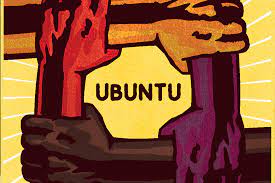
Monday 21st February, 2022
I am who I am because we are who we are…
Click for more
In our most recent podcast, Fierce Love, Jacqui Lewis takes on a journey to explore the Ubuntu philosophical idea that we make each other through the sharing of our lives and through the community we develop together. Fierce Love is the name of her most recent book.
Jacqui leads a church in New York and in the podcast suggests that the only way we are going to negotiate the division and isolation of our time will be to practice love. She refers this as fierce love to ensure that we are not going to think she is talking about a soft romanticised understanding of love. The love she talks about seeks to make difference because people matter.
In his book, Intellectual History in Contemporary South Africa, Michael Onyebuchi Eze, points us to the essence of Ubuntu when he writes, A person is a person through other people strikes an affirmation of one’s humanity through recognition of an “other” in his or her uniqueness and difference. It is a demand for a creative intersubjective formation in which the “other” becomes a mirror (but only a mirror) for my subjectivity. This idealism suggests to us that humanity is not embedded in my person solely as an individual; my humanity is co-substantively bestowed upon the other and me. Humanity is a quality we owe to each other. We create each other and need to sustain this otherness creation. And if we belong to each other, we participate in our creations: we are because you are, and since you are, definitely I am. The “I am” is not a rigid subject, but a dynamic self-constitution dependent on this otherness creation of relation and distance.
It is easy to see how ubuntu resonates with the ideas that are being expressed in relationally interested parts of the church as they reflect on the dance of the persons of the Trinity and how we mirror that in our lives.
The Fierce Love conversation and our other podcast offerings can be accessed here: https://www.stjohnscathedral.com.au/podcasts/
Peace,
Peter+

Monday 14th February, 2022
Since I am coming to that holy room,…
Click for more
Where, with thy choir of saints for evermore,
I shall be made thy music; as I come
I tune the instrument here at the door,
And what I must do then, think here before.
Whilst my physicians by their love are grown
Cosmographers, and I their map, who lie
Flat on this bed, that by them may be shown
That this is my south-west discovery,
Per fretum febris, by these straits to die…
John Donne, From Hymn to God, My God, in My Sickness
I love the imagery that John Donne incorporates into the first two stanzas of his poem, Hymn to God, My God, in My Sickness; that we are in the process of being made into God’s music and that we are maps, crafted by the loving care of cosmographers, those who tend to us.
Both images remind me that religious practice is first and foremost about being transformed, a concept captured in the prayer over the water at Baptism. In that prayer we give thanks for the Holy Spirit who forms us into the likeness of Christ.
Our role in the process of being transformed is to make ourselves open and available to God’s transforming presence. We do that through our prayer life, our worshipping life and through spiritual conversations with trusted people. By immersing ourselves in such things we find ourselves ‘tuning the our instrument’ as John Donne has it.
At St John’s we offer many opportunities for people to be involved in these processes.
Peace,
Peter+

Monday 7th February, 2022
Last week the events surrounding the enrolment policy of a school in Brisbane demonstrated the diversity of views held by Christians…
Click for more
The school added some requirements to the enrolment contract that were, not only hurtful to members of the gender and sexuality diverse community, but were also seen as an attack on their very being. The school claimed that the approach they took on dealing with gender and sexuality was a Christian one.
A number of parents of children already enrolled at the school countered with the response that they could not sign the amended contract because of their understanding of the Christian faith. To them the faith draws them to inclusiveness and to a celebration of human diversity.
As I see it, the divergent views reveal two very different understandings of God and two very different understanding of humanity. Both can claim that the Bible supports their position. Here at St John’s we affirm the view held by the parents who refused to sign the hurtful contract.
To resolve the dissonance that these events have revealed is not going to be easy. There are difficult conversations about power, privilege and world view that must be embraced if we are to find a way to represent the light of the gospel to a world that is hungry for meaning and hope.
The events of last week hurt our mission. This week we will need to try a little harder to be seen as people who have something beautiful to give to the world. And try a little harder we will.
Peace,
Peter+

Monday 31st January, 2022
Like Simeon…
Click for more
may I grow old
in hope and in wonder.
Like Anna
may I be in love with you
all my days.
May I be open to truth,
open to surprises.
May I let your Spirit
into my life.
May I let your justice
change my behaviour.
May l live in the brightness
of your joy.
Ruth Burgess
On Sunday we kept the Feast of the Presentation. On that day we refer to the story in the Gospel according to Luke in which the infant Jesus (40 days old) is presented before God in the Temple (Luke 2.22-40).
It is a complex story, given that the ceremonies performed by the families on the day of presentation contain the vestiges of the practice of child-sacrifice. In place of the sacrifice of the first born son the family sacrifice a couple of turtle-doves, or if poor, a couple of cheaper pigeons.
It begs the question, how many of our current practices are based on the violent practices of our forebears?
One of the positive aspects of the story of the presentation is that Jesus is celebrated by two characters, Simeon and Anna, a man and a woman. Anna is recognised as being a prophet.
The fact that Anna is named at all is significant. In those days women were often not named but referred to as someone’s wife or mother, or as ‘a widow’. The very structure of this story points to the recasting of gender roles and identity that the Jesus story points us towards.
The early church embraced this transformation and included women amongst its community leaders.
In a telling testimony to the power and inertia of culture the developing equality enjoyed by women in the early church was soon to disappear as the church acquiesced to the dominant, patriarchal, Roman culture.
This year we will celebrate the 30th anniversary of the ordination of women to the priesthood. It is a significant milestone. Yet, the fact that we have only been ordaining women for 30 years and much of the church still refuses to do so, shows that the foretaste of the full expression of humanity we see in the cooperative ministry of Simeon and Anna is still some way off being achieved.
Peace,
Peter+
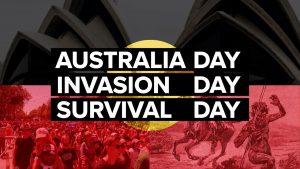
Monday 24th January, 2022
Go talk with those who are rumored to be unlike you…
Click for more
And whom, it is said, you are so unlike.
Stand on the stoops of their houses and tell them why
You are out on strike.
It is not yet time for the rock, the bullet, the blunt
Slogan that fuddles the mind toward force.
Let the new sound in our streets be the patient sound
Of your discourse.
Doors will be shut in your faces, I do not doubt.
Yet here or there, it may be, there will start,
Much as the lights blink on in a block at evening,
Changes of heart.
They are your houses; the people are not unlike you;
Talk with them, then, and let it be done
Even for the grey wife of your nightmare sheriff
And the guardsman’s son.
Richard Wilbur, For the Student Strikers
This week we observe Australia Day, a day that is becoming increasingly divisive; a day that has attracted to itself a second name, Invasion Day.
A National Day is intended to bind the people of a nation together, often around their national narrative. The conflict over the narrative that is told on Australia/Invasion Day demonstrates that we have some work to do. The dissonance between the two stories will not be resolved without some intentional work.
Richard Wilbur’s poem reminds us that listening to one another, rather than dismissing one another, is a good way to start. We certainly want to avoid falling into the use of the rock, the bullet, the blunt slogan…
Peace,
Peter+

Monday 17th January, 2022
The delightful poem below by Brian Zahnd appears in his book Water to Wine: Some of My Story….
Click for more
In the book he talks about his own personal transformation in this way: I’ve tried to explain to those willing to read my story how I reached the point where I could no longer drink the grape juice of American consumer Christianity and call it wine. I’ve done my best to chronicle how Jesus did a miracle in my life by transforming watered-down pop Christianity into something glorious and intoxicating — the full-bodied wine of a deeper and richer faith.
Brain reminds us that the story of the Wedding at Cana in Galilee that was featured in our worship on Sunday is not really a story about wine at all, but an invitation to go on the journey of transformation.
L’Chaim!
Water turned to wine
The miracle is the time
That it did not take
For common to turn extraordinaire
Tap water into carménère
Drawn from pots of ritual purity
Taken to the master of the party
Hints of plum and kingdom come
Salute!
In Nazareth he was called the carpenter
In Cana he became a master vintner
Sommelier said it’s a hundred point wine
The miracle-worker did it without a vine
A whole barrel of vintage year thirty
Better than the best from Cape Verde
All so the feast would not cease
A toast to Mary for her idea
L’chaim!
We walked from Nazareth to Cana
In the fall of my fifty-fourth year
Talking Jesus all along the way
Took us the better part of a day
Every other store up and down the line
A Christian selling some kind of wine
Call it a entrepreneurial witness to —
Jesus’ first miracle
Cheers!
Water turned to wine
The mystery is the time
It takes for my own transformation
A slow and painful fermentation
With a soul like crushed grapes
I’m a dusty bottle in God’s cellar
But the winemaker knows his craft
He makes all things beautiful in their time
Hallelujah!
Brian Zahnd, Water to Wine: Some of My Story.
Peace,
Peter+
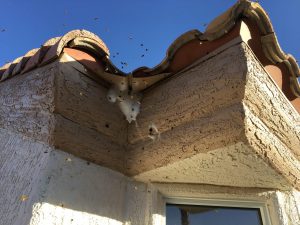
Monday 10th January, 2022
The bees build in the crevices…
Click for more
Of loosening masonry, and there
The mother birds bring grubs and flies.
My wall is loosening; honey-bees,
Come build in the empty house of the stare.
We are closed in, and the key is turned
On our uncertainty; somewhere
A man is killed, or a house burned.
Yet no clear fact to be discerned:
Come build in the empty house of the stare.
A barricade of stone or of wood;
Some fourteen days of civil war:
Last night they trundled down the road
That dead young soldier in his blood:
Come build in the empty house of the stare.
We had fed the heart on fantasies,
The heart’s grown brutal from the fare,
More substance in our enmities
Than in our love; O honey-bees,
Come build in the empty house of the stare.
The Stare’s Nest by my Window, William Butler Yeats,
From Meditations in Time of Civil War
Some of our community have already chosen to enter into a period of lockdown. The number of people at Church has reduced dramatically since mid-December.
W B Yeats wrote The Stare’s Nest by my Window during the Civil War in Ireland in the 1920’s. His family had also been significantly impacted by the Spanish Flu Epidemic in 1918, as well as by the aftermath of World War 1. It was time of incredible stress and challenge.
In the poem Yeats, I think, captures the sentiments held by many of us in these days as Covid finally takes hold on our community:
We are closed in, and the key is turned
On our uncertainty.
It is interesting to note that Yeats also writes about discovering honey, something sweet and somewhat miraculous, in the midst of his experience of being locked-in and uncertain.
Years later Yeats was to say that his poem was the result of ‘an overmastering desire not to grow unhappy or embittered, not to lose all sense of the beauty of nature… a strange thing happened. I began to smell honey in places where honey could not be…’.
A Starling is called a Stare in West Ireland.
Peace,
Peter+
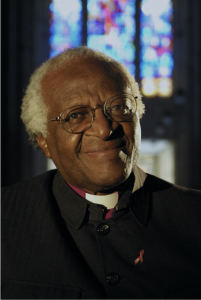
Monday 3rd January, 2022
On Tuesday at 10am we will hold a service to give thanks for the legacy of Archbishop Desmond Tutu.
Click for more
Here is one of my favourite Tutu quotes:
When we see others as the enemy, we risk becoming what we hate. When we oppress others, we end up oppressing ourselves. All of our humanity is dependent upon recognizing the humanity in others.
Peace,
Peter+
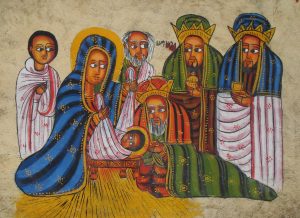
Monday 27th December, 2021
Here is another poem from Rilke.
Once again it is inspired by the person of Mary.
Click for more
Without your simplicity, how could this
have happened–what now shines in the dark of night?
The God who thundered over the nations
makes himself mild and through you enters the world.
Were you expecting something greater?
What is greatness? He moves straight through
all measurements we know, dissolving them away.
Even the path of a star is not like that.
Behold: these kings standing here are great
and drag into your lap rare treasures
that each believes to be the greatest.
Perhaps you are astonished at their gifts.
But look into the blanket in your arms,
how He already surpasses all of them.
Amber that is traded near and far,
rings of gold and costly spices
that drift for a moment on the air:
these are quickly fading pleasures
and leave behind a vague regret.
The gift He brings–as you will see–is joy.
Rilke, The Birth of Christ
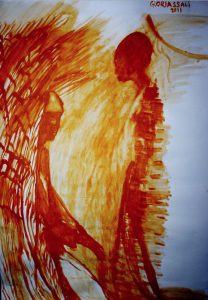
Monday 20th December, 2021
The angel’s entrance (you must realize)…
Click for more
was not what made her frightened. The surprise
he gave her by his coming was no more
than sun or moon-beam stirring on the floor
would give another, — she had long since grown
used to the form that angels wear, descending;
never imaging this coming-down
was hard for them….
No, not to see him enter, but to find
the youthful angel’s countenance inclined
so near to her; that when he looked, and she
looked up at him, their looks so merged in one
the world outside grew vacant, suddenly,
and all things being seen, endured and done
were crowded into them: just she and he
eye and its pasture, visions and its view,
here at the point and at this point alone:-
see, this arouses fear. Such fear both knew.
Rainer Maria Rilke, Annunciation to Mary
From The Life of Mary
The encounter between Mary and Gabriel, which occupies a pivotal moment in the story leading to Christmass, is an event that has captured the imagination of many.
Poets and artists have sought to plumb the depths of the complexity and meaning of that encounter. Was Mary meek and compliant? Was she strong and defiant? Did she interrogate the Angel?
It is an amazing exercise to act out the scene imagining Mary with different personality traits.
These reflections are important because they help us explore the idea of God’s will and how we exercise our capacity for free will in that context. Could Mary have said ‘no’ to the angel’s request? I understand that the answer to that question is, ‘Yes, she could have said “no”’.
Rilke in the poem, The Annunciation to Mary, explores the idea of Mary being of equal stature to the angel. The angel was as afraid as she was during the encounter, and yet there was a deep connection between the two. Out of that deep relationship and encounter, Mary felt enabled to say ‘Yes’.
The encounter invites us to reflect on the times we have felt a deep connection to God and others and the way that sense of connection enables us to act in adventurous ways.
Peace,
Peter+
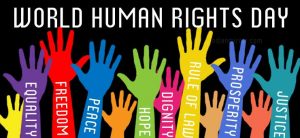
Monday 13th December, 2021
Tonight at 6pm St John’s will be hosting a United Nations Association of Australia (UNAA) event in honour of International Human Rights Day.
Click for more
As we observe this important day, I want to reflect on the idea that individualism is an increasing threat to individual rights.
Individualism is an increasing threat to individual rights.
The thing about our basic rights is that they can only find genuine and universal expression in a social context; they need society to operate in a particular way for them to be delivered. So, our rights to feel safe, and to have access to clean water, good sanitation, health care and education can only be universally accessed when there are societal systems that enable and protect them. These systems ensure that education and health care, for example, can be accessed by the poor. Access is not restricted to those who can afford to pay; access is by right and enabled by a particular way of being together.
Christian social teaching refers to the framing that guides the development of such a society as the pursuit of the common good.
Vatican II expressed the concept of common good in this way:
The common good is the sum of those conditions of social life which allow social groups and their individual members relatively thorough and ready access to their own fulfillment.
Individualism is seen as an increasing threat to individual rights because there is an developing tendency to see rights as pertaining to the individual in isolation, as not being dependent on the social context. This leads to many losing sight of the role that the social context plays in ensuring that our rights are not only safeguarded, but also enabled.
One example of how this is playing out is provided by the pursuit of what is claimed to be ‘the right to bear arms’ in the USA.
In Australia in 2019, the figure for gun deaths by homicide and suicide was 0.88 per 100 000. In the USA, the figure for 2017 was 12.21 per 100 000. Further, since we implemented stricter gun control in 1996 there have been no mass shootings in Australia, while in the USA, in 2020 alone, there were 611.
The above means that in the USA, society is not organised in a way to enable people to have access to such a basic right as the right to be safe. Every year, thousands of people have their individual right to life and their right to live in safety obliterated by individuals claiming a ‘right’ to bear arms.
The US therefore fails the basic common good test when it comes to the right to safety. Australia does a better job, but given that we still have way more deaths than say, Japan, the principle of pursuing the common good invites us to ask if we could be doing more.
So, as we observe Human Rights Day, we would do well to reflect on how increasing individualism is undermining individual freedoms by recrafting society in ways that make it more difficult to pursue the common good. And as we do that, we can take a close look at some of the ‘rights’ that are being claimed in the public discourse and protest around vaccination.
Peace,
Peter+
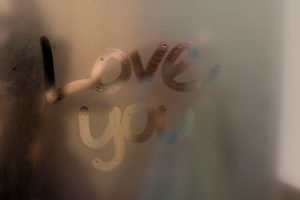
Monday 6th December, 2021
As we continue our Advent journey I return to one of my favourite Advent poems, The Kingdom, by R S Thomas…
Click for more
It’s a long way off but inside it
There are quite different things going on:
Festivals at which the poor man
Is king and the consumptive is
Healed; mirrors in which the blind look
At themselves and love looks at them
Back; and industry is for mending
The bent bones and the minds fractured
By life. It’s a long way off, but to get
There takes no time and admission
Is free, if you purge yourself
Of desire, and present yourself with
Your need only and the simple offering
Of your faith, green as a leaf.
The Kingdom, R S Thomas
I see the poem as an Advent poem because in Advent we seek to imagine what the world will be like when it reaches its fulfilment, when the prophetic imagination is realised, and this poem gives us some hints about what that means and how we get there.
The poem suggests that while at one level the kingdom, the place of fulfilment, is way, way off, at another level we can see that it would not take much for a lot of its potential to be realised. After all, we live is world that produces more than enough food to feed everyone, so with just a little bit of imagination and generosity all the hungry could be fed.
The poem therefore is important to me as its speaks to the Advent theme of hope. We can make a difference through the exercising of our faith, and living the hope we proclaim.
Peace,
Peter+
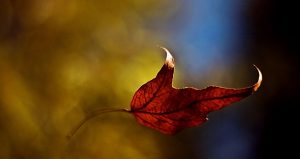
Monday 29th November, 2021
He will come like last leaf’s fall….
Click for more
One night when the November wind
has flayed the trees to the bone, and earth
wakes choking on the mould,
the soft shroud’s folding.
He will come like frost.
One morning when the shrinking earth
opens on mist, to find itself
arrested in the net
of alien, sword-set beauty.
He will come like dark.
One evening when the bursting red
December sun draws up the sheet
and penny-masks its eye to yield
the star-snowed fields of sky.
He will come, will come,
will come like crying in the night,
like blood, like breaking,
as the earth writhes to toss him free.
He will come like child.
Advent Calendar, Rowan Williams
The Season of Advent began on Sunday. Advent begins the Church year and serves a double purpose. It provides us with four weeks to prepare for Christmass as the Feast of the Coming of Christ. It also invites us to be on alert for the many ways in which Christ comes to us and for the fulfilment of all things in Christ. Rowan Williams’ poem captures this theme beautifully; Christ comes as leaf fall, frost, dark and child.
How has Christ appeared to you?
Peace,
Peter+
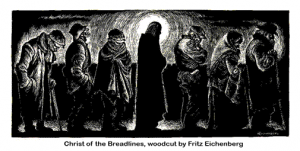
Monday 22nd November, 2021
Our King is calling from the hungry furrows…
Click for more
Whilst we are cruising through the aisles of plenty,
Our hoardings screen us from the man of sorrows,
Our soundtracks drown his murmur: ‘I am thirsty’.
He stands in line to sign in as a stranger
And seek a welcome from the world he made,
We see him only as a threat, a danger,
He asks for clothes, we strip-search him instead.
And if he should fall sick then we take care
That he does not infect our private health,
We lock him in the prisons of our fear
Lest he unlock the prison of our wealth.
But still on Sunday we shall stand and sing
The praises of our hidden Lord and King.
Malcolm Guite, Christ the King
Sunday was the Feast of Christ the King. More recently it has been referred to as The Reign of Christ.
Malcolm Guite’s poem reminds us that the use of the term King by and about Jesus was meant to unsettle our image of King; to overturn it in fact.
It is often the case, however, that rather than overturning our understanding of the concept of King, the commonly held understanding of a king is applied to Jesus and is used to transform our understanding of him. So Jesus as King becomes remote and separated from the life we live.
Malcolm Guite invites us to reaffirm that the one who yesterday’s feast holds to be reigning is calling to us, not from a gilded throne, but rather from the hungry furrows so that we might be set free from the prisons of our fear.
Peace,
Peter+

Monday 15th November, 2021
No one lives his life….
Click for more
Disguised since childhood,
haphazardly assembled
from voices and fears and little pleasures,
We come of age as masks.
Our true face never speaks.
Somewhere there must be storehouses
where all these lives are laid away
like suits of armor or old carriages
or clothes hanging limply on the walls.
Maybe all paths lead there,
to the repository of unlived things.
Rilke’s Book of Hours: Love Poems to God
This poem by Rilke is one of the most devastating I have ever read. R S Thomas’, The Island, beats it by a whisker.
Rilke’s poem suggests that we are each so shaped by life events, the voices of parents and the opinions of others that our true self is lost, consigned to the repository of unlived things.
I actually don’t share Rilke’s view, but do take it as a potent warning. I think it is possible to live an authentic life, to be true to oneself.
The poem stands as warning because there are incredible pressures on us to conform, to be silent in the face of structural injustice and to accept that the way things are is the way they have to be.
Through Baptism followers of The Way are called to recognise that they are unique, uniquely gifted and uniquely loved. One of the calls this places on us is the we allow our true face to speak.
Peace,
Peter+

Monday 8th November, 2021
The little lives of earth and form….
Click for more
Of finding food, and keeping warm,
Are not like ours, and yet
A kinship lingers nonetheless:
We hanker for the homeliness
Of den, and hole, and set.
And this identity we feel
– Perhaps not right, perhaps not real –
Will link us constantly;
I see the rock, the clay, the chalk,
The flattened grass, the swaying stalk,
And it is you I see.
The Little Lives Of Earth And Form,
Philip Larkin
Philip Larkin’s little poem simply seeks to remind us that we are more like the other creatures that inhabit this planet than western human hubris likes to think. We all want to have a warm and dry place to sleep and hope not to go to bed hungry. Larkin invites us to look at the other creatures and see ourselves.
For the Cop26 meeting in Glasgow to be success, those leading the negotiations will need to find the capacity to see the ‘other’ – whether that ‘other’ be a human from a less developed nation or a creature whose habitat is under threat – and respond with empathy and compassion.
Thus far Australia has been portrayed as selfish nation as our politicians look to short-term outcomes. My prayer is that those who hold a more expansive vision of what life can be, the life we proclaim as the Commonwealth of God, will capture the imaginations of those who are determined to hold us back.
Peace,
Peter+

Monday 1st November, 2021
In his preface to Charles Williams’ novel, All Hallows’ Eve, T S Eliot wrote….
Click for more
The deeper things are there just because they belonged to the world he lived in, and he could not have kept them out. For the reader who can appreciate them, there are terrors in the pit of darkness into which he can make us look; but in the end, we are brought nearer to what another modern explorer of the darkness has called “the laughter at the heart of things.”
All Hallows’ Eve or Halloween has long-held a place in the public imagination. These days it plays out as something of a pantomime, with over-the-top costumes and ‘trick and treating’. Yet dressing up, special food and lanterns made of vegetables were all part of the Christian festival of All Hallows’ Eve.
The interest in All Hallows’ Eve, the day – and more especially the night – before All Saints’ Day, reflects our human fascination with death, with what happens to the dead after they have been alive and the with the space between life and death.
Various parts of the Christian tradition hold that those who have died journey towards heaven after death, or that they do ‘soul work’ after death, or that some go to a place of waiting. Words such a Purgatory and Hades capture some of this.
If nothing else, these posturings remind us that each of us carries with us a sense that sometimes things can be in-between; that unfinished business can hold us back and that we can experience dark things, even when we believe that the light will eventually conquer the darkness.
Days like Holy Saturday, which reminds us that sometimes the only thing we can do is wait, and All Hallows’ Eve, which reminds us that there will be times when we have to look at what T S Eliot called ‘the terrors in the pit of darkness’, play an important role is helping us live into life’s liminality.
I think T S Eliot was also correct when he suggested that it is through embracing these journeys into uncertainty that we find that the path leads us to experience “the laughter at the heart of things.”
Peace,
Peter+
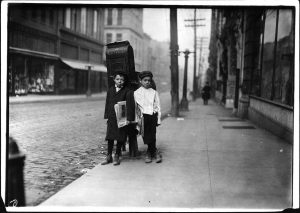
Monday 25th October, 2021
So early it’s still almost dark out….
Click for more
I’m near the window with coffee,
and the usual early morning stuff
that passes for thought.
When I see the boy and his friend
walking up the road
to deliver the newspaper.
They wear caps and sweaters,
and one boy has a bag over his shoulder.
They are so happy
they aren’t saying anything, these boys.
I think if they could, they would take
each other’s arm.
It’s early in the morning,
and they are doing this thing together.
They come on, slowly.
The sky is taking on light,
though the moon still hangs pale over the water.
Such beauty that for a minute
death and ambition, even love,
doesn’t enter into this.
Happiness. It comes on
unexpectedly. And goes beyond, really,
any early morning talk about it.
Happiness, from All of Us: The Collected Poems,Raymond Carver.
Whenever I announced a life decision to my mum she would ask just one question, ‘Are you happy?’
Happiness, like joy, is a rather skittish concept. Both are deeper and more complex than we sometimes imagine. I think they are also closely linked. Raymond Carver’s poem, Happiness, I think captures that connection. One can sense the deep joy that the boys in the poem are experiencing, the joy of being alive and the joy of friendship, as well as their profound happiness.
Aristotle suggested that true happiness was to be found when one found oneself doing what one is supposed to be doing. In Christian parlance we would say happiness lies in living out one’s vocation.
This understanding of happiness, and of joy, points us to the fact that true happiness can be experienced even in the midst of challenging circumstances.
Peace,
Peter+
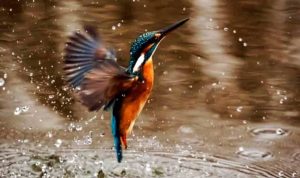
Monday 18th October, 2021
As kingfishers catch fire, dragonflies dráw fláme; …
Click for more
As tumbled over rim in roundy wells
Stones ring; like each tucked string tells, each hung bell’s
Bow swung finds tongue to fling out broad its name;
Each mortal thing does one thing and the same:
Deals out that being indoors each one dwells;
Selves—goes itself; myself it speaks and spells,
Crying Whát I do is me: for that I came.
Í say móre: the just man justices;
Kéeps gráce: thát keeps all his goings graces;
Acts in God’s eye what in God’s eye he is—
Chríst—for Christ plays in ten thousand places,
Lovely in limbs, and lovely in eyes not his
To the Father through the features of men’s faces.
Gerard Manley Hopkins, As Kingfishers Catch Fire
A few weeks ago I referred to another of Gerard Manley Hopkins’ poems, God’s Grandeur. In it Hopkins celebrates the gift of nature, which he sees as revealing the beauty of God, and finds himself wondering why humanity treats it with such disrespect.
In As Kingfishers Catch Fire Hopkins again proclaims the magnificent capacity that nature has to reveal God and reminds us that even the stones have value simply because they are. His poetry provides a significant challenge to our utilitarian culture which values things, even people, on the basis of their usefulness to humans.
Today is the Faiths4Climate Day of Action. I and a number of people of varying faiths took part in a vigil outside the office The Member for Brisbane, Trevor Evans, during the morning. We are calling on the Federal Government to set meaningful and significant targets for carbon pollution reduction by 2030.
Hopkins speaks for people of all faiths when he proclaims the value of nature. The approaching COP26 in Glasgow will provide our leaders and leaders from around the world with the opportunity to show that they too appreciate nature’s gifts and beauty.
Peace,
Peter+

Monday 11th October, 2021
The house of my being was not secure against the elements…
Click for more
and too many windows were open.
A stormy wind hurled me along a passage,
and my foot dislodged the catch of a trapdoor that I did not know existed.
I fell down rotten steps,
the door clanged shut,
and I landed unconscious on the stone floor of a dark cellar.
There was enough air through a ventilation shaft for survival.
From time to time voices and shadowy figures would impinge on my awareness,
and they became clearer as my eyes got used to the dark.
Some were earthed enough to sit with me without intruding
and helped me discover that the stone floor was trustworthy.
And little by little the steps were repaired with the help of ‘angel-messengers’
descending and ascending upon them.
A few sat on the top step and blocked out the light …
Brainsquall, Jim Cotter
Jim Cotter was a Welsh Anglican Priest and poet. In 1994 he suffered a breakdown. This was followed by a time in deep depression. He kept a record of his depression journey which he titled, Brainsquall. The excerpt above is his description of a dream he had as he descended into the depression.
I read Brainsquall when it first came out. At the end of that read I felt that for the first time in my life I had gained some sense of the experience that people with severe mental illness have to endure. I caught a glimpse of how deep and profound such experiences can be. It helped me learn how to listen to those who are experiencing a mental health crisis and showed me the importance of being present and available for those who find themselves in some of the earth’s darkest places. In Brainsquall, Jim pays tribute to the friends who kept on turning up.
In more recent times I have found Les Murray’s poetry equally helpful.
We are currently in Mental Health week; a week to listen and attend.
Peace,
Peter+

Monday 4th October, 2021
Click for more
‘From the cross
Your saviour spoke to you and speaks to us
Again through you. Undoing set you free,
Loosened the traps of trappings, cast away
The trammelling of all that costly cloth
We wind our saviour in. At break of day
He set aside his grave-clothes. Your new birth
Came like a daybreak too, naked and true
To poverty and to the gospel call,
You woke to Christ and Christ awoke in you
And set to work through all your love and skill
To make our ruin good, to bless and heal
To wake the Christ in us and make us whole.
Malcolm Guite, Sonnet for St Francis
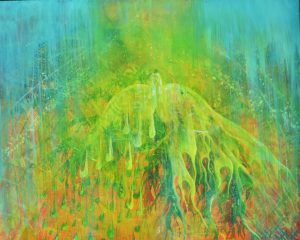
Monday 27th September, 2021
The world is charged with the grandeur of God…
Click for more
It will flame out, like shining from shook foil…..
God’s Gandeur, Gerard Manley Hopkins
Gerard Manley Hopkins was writing his poetry in later half of the Nineteen century. He was enamoured by the beauty of the natural world and the way it manifested the presence of God.
He was also troubled by the effect that the industrial revolution was having on people and the environment. It was the era of working-class slums and heavily polluted rivers and air. And so, his poem, God’s Grandeur, continues:
Why do men then now not reck his rod?
Generations have trod, have trod, have trod;
And all is seared with trade; bleared, smeared with toil;
And wears man’s smudge and shares man’s smell: the soil
Is bare now, nor can foot feel, being shod.
Hopkin’s concern was shared by many poets. William Blake, predated Hopkins but shared his also concern. His poem, Jerusalem, visions England as a holy land:
And did those feet in ancient time
Walk upon Englands mountains green:
And was the holy Lamb of God,
On Englands pleasant pastures seen!
But laments the disfiguring presence of the dark Satanic Mills.
Blake then dedicates himself to fulfilling a vision of the earth restored. He will not rest
Till we have built Jerusalem,
In Englands green & pleasant Land.
Thomas Traherne provides a third example of this doublet that celebrates the presence of God in creation while lamenting the loss of that appreciation by many in his day. In his work The First Century, he first points the reader to the delight of being connected to the natural world:
You never enjoy the world aright, till the Sea itself floweth in your veins, till you are clothed with the heavens, and crowned with the stars: and perceive yourself to be the sole heir of the whole world, and more than so, because men are in it who are every one sole heirs as well as you. Till you can sing and rejoice and delight in God, as misers do in gold, and Kings in sceptres, you never enjoy the world.
He then shares his lament and concern:
Yet further, you never enjoyed the world aright, till you so love the beauty of enjoying it, that you are covetous and earnest to persuade others to enjoy it. And so perfectly hate the abominable corruption of men in despising it that you had rather suffer the flames of hell than willingly be guilty of their error.
There is some comfort, a kindling of optimism, to be had as we note that previous generations faced an ecological crisis, a crisis that was largely overcome. Today England is far more green and pleasant land than it was in the days of Blake.
May their gift to us be a sense of optimism that we will see us tackle the ecological crisis that faces us.
Peace,
Peter+
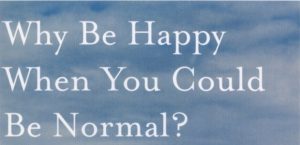
Monday 20th September, 2021
I’ve always tried to make a home for myself,…..
Click for more
but I have not felt at home in myself.
I’ve worked hard at being the hero of my own life.
But every time I checked the register of displaced persons,
I was still on it.
I didn’t know how to belong.
Longing? Yes.
Belonging? No.
Jeanette Winterson, Why Be Happy When You Could Be Normal?
The title of Jeanette Winterson’s memoir, Why Be Happy When You Could Be Normal?, comes from a comment that her adoptive mother made as she was evicting Jeanette from the family home. Jeanette was 16 years old.
Jeanette had just revealed that for the second time in her life she had a girlfriend. The meant that the adoptive mother’s attempts to have the ‘lesbian’ demon exorcised, following the discovery of the first girlfriend, had failed. And so, Jeanette herself was now to be ‘cast out’.
Why be happy when you could be normal?
Later in the memoir we discover that Jeanette’s adoptive mother had also sacrificed happiness for ‘normality’.
The whole tale is one of the tragic waste of human potential.
Our culture, and much of the church, is still incredibly cruel to LGBTQI+ people.
I am constantly in awe of the LGBTQI+ people I encounter though my life and ministry. Most of them have had to struggle against some version of the pressure to conform to ‘normality’ at the cost of, not only happiness, but of their true self.
I for one, today, wish to honour the way so many hold to the living of an authentic life in the face of such a nihilistic demand.
The Cathedral Community is observing Pride Month during September.
Peace,
Peter+

Monday 13th September, 2021
Earth burning mother
Hear the roar, feel the heat…
Click for more
Hearts rapid beat, screams, cry, weep
Consciousness must awaken
Ancestors whisper in the wind
Ensures a timely roar
Totems burning, trees gone it’s time
Return to sacred now
Join hands awaken
honour first people’s knowledge
Ones who walked the earth since the Dreamtime
listen and learn proper way
Fire knowledge passed down
Respect and honour fire wisdom
Care for land the right way
Ancient teachings state
time to listen
Interconnectedness is the only way forward
bring back pride in our countries Indigenous knowledge and wisdom
We share in this together embrace each other live in harmony
the animals, birds, and plants are our kin
Respect them and each other
that is the one truth
for our Mother Earth our creator she nurtured all
It’s time
to grow up the country proper way
Indigenous sacred way now.
Earth Mother by ‘Miimi and Jiinda’ – Gumbaynggirr Elder Lauren Jarrett and her Daughter – Culture is Life’s National Project Manager – Melissa Greenwood.
As we move into the second week of the season of creation we are encouraged to embrace the idea that the eco-catastrophe and the climate emergency, which is part of the the eco-catastrophe, present humanity with a very complex set of issues. Simple responses to complex problems are never helpful.
To deal with the complexity that faces us we are going to need to listen well to the various sources of wisdom that are available to us: scientists and experts, technocrats and innovators, farmers and ecologists. We are also fortunate to have the wisdom of our first peoples, the people who have lived in and with this land for millennia.
At its best the Christian community is a listening community; it seeks to train itself to listen to the ‘still small voice’ of God. Perhaps our role in responding to the eco-catastrophe might be to model good listening to a world that has become increasingly full of shouting.
Peace,
Peter+
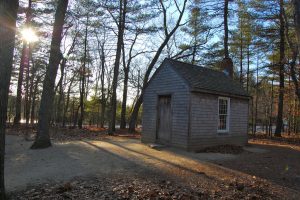
Monday 6th September, 2021
My profession is to be always on the alert to find God in nature – to know his lurking places to attend to all the oratorios and the operas in nature.
Henry David Thoreau (Notebook)
Click for more
Henry David Thoreau took himself off to live for two years, two months and two days in a cabin that built for himself in Massachusetts.
He attended to the place, observing the species of animal, fish, plants and trees, making notes and writing poetry in response to what he was experiencing. He was deeply transformed by the experience.
As we enter more deeply into the Season of Creation, Thoreau’s experience invites us to reflect on separated many of us have become from what we ‘other’ through the use of the word nature.
How can we reconnect to the world in which we live and move and have our being so that we too can be moved by the oratorios preformed by God in the world?
Peace,
Peter+
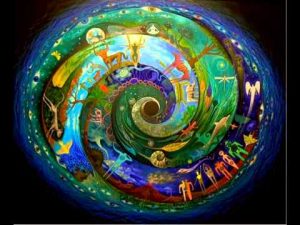
Monday 30th August, 2021
“LAUDATO SI’, mi’ Signore” – “Praise be to you, my Lord”…..
Click for more
In the words of this beautiful canticle, Saint Francis of Assisi reminds us that our common home is like a sister with whom we share our life and a beautiful mother who opens her arms to embrace us. “Praise be to you, my Lord, through our Sister, Mother Earth, who sustains and governs us, and who produces various fruit with coloured flowers and herbs”.
This sister now cries out to us because of the harm we have inflicted on her by our irresponsible use and abuse of the goods with which God has endowed her. We have come to see ourselves as her lords and masters, entitled to plunder her at will. The violence present in our hearts, wounded by sin, is also reflected in the symptoms of sickness evident in the soil, in the water, in the air and in all forms of life. This is why the earth herself, burdened and laid waste, is among the most abandoned and maltreated of our poor; she “groans in travail” (Rom 8:22). We have forgotten that we ourselves are dust of the earth (cf. Gen 2:7); our very bodies are made up of her elements, we breathe her air and we receive life and refreshment from her waters.
Nothing in this world is indifferent to us
The first two paragraphs of Laudato Si, Pope Francis’ second encyclical, set the scene for us as we prepare to enter the Season of Creation.
The Season of Creation commences on September 1, the day the Orthodox Churches celebrate Creation Day, and concludes on October 4, The Feast of St Francis of Assisi, the Western Church’s ecological saint.
Pope Francis reminds us that at its heart the ecological crisis and the related climate crisis both trace their origins to a breakdown in our relationship with our sister, Mother Earth. In this season we will reflect deeply on how we might be restored to right relationship.
Nothing in this world is indifferent to us
Peace,
Peter+

Monday 23rd August, 2021
A Lament for Afghanistan
O my idol! A cloud from Paradise….
Click for more
Has bestowed an emerald gown on the earth.
Deserts are like blood-stained silk
And the sky has the fragrance of musk.
With a mixture of musk and red wine
An artist has drawn an image of my love on the desert.
The world has become peaceful
For both the tiger and the deer.
For such occasions. we need a sun-faced idol,
And a moon. leaning on a cushion of sun.
We must have an idol with cheeks like rubies,
And red wine to match the cheeks.
The world has become a peacock,
With roughness here and smoothness here.
Mud smells of roses,
As though kneaded with rose water.
Daqiqi of Balkh
I have been reeling as result of the imagery and reportage that has been coming out of Afghanistan in the wake of the Taliban’s takeover of the nation.
I am deeply saddened by what I imagine will be the plight of women and girls. I can only imagine the feeling of terror that must be surging through religious minorities, those who assisted western nations and who have now been betrayed and abandoned to their fate, those who are fleeing and those who are unable to flee, those who face certain death.
I find myself thinking too, of those who gave themselves so wholeheartedly to the mission to which our government committed us; those who must be questioning whether it might all have been in vain; those who loved ones were killed or permanently altered.
It is a complex time, and the series of emotions are just as complex.
As is often the case when I face complexity, I turn to the poets. Today’s poem is by the Afghan (Persian) poet Daqiqi of Balkh.
Peace,
Peter+

Monday 16th August, 2021
Planet-Centred
Civilized, crying: how to be human again; this will tell you how…
Click for more
Turn outward, love things, not men, turn right away from humanity,
Let that doll lie. Consider if you like how the lilies grow,
Lean on the silent rock until you feel its divinity
Make your veins cold; look at the silent stars, let your eyes
Climb the great ladder out of the pit of yourself and man.
Things are so beautiful, your love will follow your eyes;
Things are the God; you will love God and not in vain,
For what we love, we grow to it, we share its nature. At length
You will look back along the star’s rays and see that even
The poor doll humanity has a place under heaven.
Its qualities repair their mosaic around you, the chips of strength
And sickness; but now you are free, even to be human,
But born of the rock and the air, not of a woman.
Sign-post, Robinson Jeffers
Robinson Jeffers was an American poet who died in 1962. He was deeply troubled by humanity’s self-centred approach to the earth and nature.
William Everson, in Robinson Jeffers: Fragments of an Older Fury, suggests that Jeffers ‘saw that only a humanity which contemplates unremittingly the divine Otherness can be whole, can maintain wholeness; that a humanity turned from contemplation inevitably becomes obsessed with itself’.
Although Jeffers was writing over half-a-century ago, his poetry places before something of the nature of the significant challenge we face as we come to terms with the Climate Crisis.
The relational and spiritual aspects of the challenge of dealing with climate change are not often included in the conversation we are having about how we move forward. Most often the needed response is seen in simple terms: reducing our carbon emissions, installing solar panels, buying electric cars, and eating less meat.
Understanding that the way out of the crisis also involves attending to the way we relate to the other creatures, to the planet as whole, and to our spirituality, helps us appreciate that both the problem and our response are more complex than they often appear. We must attend to the way we understand ourselves in nature and look for ways to live in balance.
Recognising the complexity of the situation enables us to look carefully at the simplistic approaches to solving the climate crisis that have been offered so far. Following simplistic solutions might see us trash the planet as we mine Lithium and ever more iron ore, further adding to the ecological crisis that is also with us.
Appreciating the complexity allows us to explore options that are more transformative than the simplistic approaches at present on offer.
Climb the great ladder out of the pit of yourself and man.
Things are so beautiful, your love will follow your eyes.
Things are the God, you will love God, and not in vain.
For what we love, we grow to it, we share its nature. …
Now you are free to become human.
Peace,
Peter+

Monday 9th August, 2021
Ordinary Time
Click for more
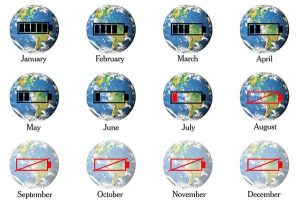
Monday 2nd August, 2021
Earth Overshoot Day
Click for more
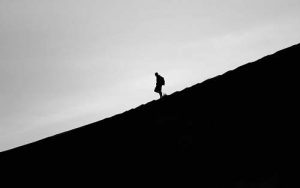
Monday 26th July, 2021
The Way of the Wise
The first king was on horseback.
The second a pillion rider.
The third came by plane…
Click for more
The first king was on horseback.
The second a pillion rider.
The third came by plane…
Where was the god-child?
He was in the manger
with the beasts, all looking
the other way where fourth
was a slow dawning because
wisdom must come on foot.
A Slow Dawning — R S Thomas, Counterpoint (1990)
In A Slow Dawning R S Thomas plays with the imagery of the three kings visiting the Christ child. He introduces a fourth king to the story. The first three arrive using forms of rapid transport. They rush at and into the Christmass scene.
The fourth, wisdom, takes time to arrive.
The writers of the Wisdom literature we find in Biblical books like Proverbs help us to understand the essence of wisdom. They do this by comparing and contrasting the behaviour of the wise one and the foolish, the unwise.
Those who gather crops on time are wise, but those who sleep through the harvest are a disgrace. (Proverbs 10.5)
Wise people think before they act; fools don’t—and even brag about their foolishness. (Proverbs 13:16).
The way of fools seems right to them, but the wise listen to advice. (Proverbs 12:15).
Wisdom is a slow mover because wisdom comes from seeing clearly, noticing, and then thinking carefully about what is happening before acting. Sadly, intelligence is not a measure or guarantee of wisdom.
Peace,
Peter+

Monday 19th July, 2021
Compassion
Of all the public places, dear
to make a scene, I’ve chosen here.
Of all the doorways in the world…
Click for more
to choose to sleep, I’ve chosen yours.
I’m on the street, under the stars.
For coppers I can dance or sing.
For silver-swallow swords, eat fire.
For gold-escape from locks and chains.
It’s not as if I’m holding out
for frankincense or myrrh, just change.
You give me tea. That’s big of you.
I’m on my knees. I beg of you.
Give, Simon Armitage
One of the pivotal aspects of last Sunday’s gospel story was that of Jesus being moved with compassion for the crowds. Compassion is a deeply felt emotion. In fact, the Greek word used in the New Testament which we translate as compassion, literally means ‘to have your intestines wrenched’; to feel for another in the depths of your being; in your bowels.
The thing about compassion is that it spurs the one who feels it into action; it makes them into agents of change. Whether we become change agents or not in response to the plight of another, reveals whether we have felt compassion for them or merely felt pity. Experiencing pity in response to the plight of another leads us to hand out food and blankets. If we have compassion for them, we are driven to want to change the system. Pity can get fatigued; compassion doesn’t.
In his poem, Give, Simon Armitage plays with the word change. At first reading the homeless person who has inconveniently appeared on the front step of a hapless householder might be understood to be asking for a few small denomination coins. A deeper reading suggests that the change they are seeking is the one that can only be achieved by transformation.
Peace,
Peter+
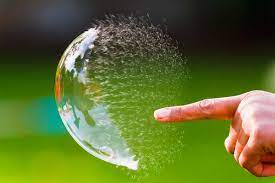
Monday 12th July, 2021
Fragility
There are so many fragile things, after all.
People break so easily,
and so do dreams and hearts.
Neil Gaiman, Fragile Things: Short Fictions and Wonders
Click for more
I have been thinking a lot about fragility lately, and about how we need to give it more attention.
The response to the Covid-19 pandemic, political shenanigans, the plight of our planetary system and the stories I have been hearing from members of our faith community have all led me down this path.
Authorities in various jurisdictions, football players and people who think that their party must go ahead have failed to see how fragile the safe place we have managed to create in this covid-affected world is, and how easily that safe place can slip away.
Many of our political leaders are prepared to stretch our democratic framework for short-term gain. Rorting, prideful, naked contempt for accountability, cynical messaging and pandering to powerful interest groups, all undermine the confidence that the people have in our institutions. Our institutions float on a thin bubble of trust. It is more fragile than a butterfly’s’ wing.
The sheer size of the earth and its abundance – its extravagant abundance – lead us to think that it is stable and infinite. In fact, it is fragile, held together by frogs eggs and gossamer threads. The recent heatwaves in North America, wildfires across the globe, including here, remind us of the inevitable consequences of shattering the earth’s system. No amount of political spin or hubris-driven self-assurance will put a shattered eco-system back together.
People are fragile too. Our culture talks too much about independence, resilience, and self-reliance. Such talk makes people feel like they must be strong and impervious. Many assume that others can and should take whatever they dish out. Yet the truth is that some who seem to have it all together are holding on by their fingernails.
If we understood one another’s fragility, we would be more kind.
Peace,
Peter+

Monday 5th July, 2021
NAIDOC Week
Click for more
Look up, my people,
The dawn is breaking,
The world is waking
To a new bright day,
When none defame us,
No restriction tame us,
Nor colour shame us,
Nor sneer dismay.
Now brood no more
On the years behind you,
The hope assigned you
Shall the past replace,
When a juster justice
Grown wise and stronger
Points the bone no longer
At a darker race.
So long we waited
Bound and frustrated,
Till hate be hated
And caste deposed;
Now light shall guide us,
No goal denied us,
And all doors open
That long were closed.
See plain the promise,
Dark freedom-lover!
Night’s nearly over,
And though long the climb,
New rights will greet us,
New mateship meet us,
And joy complete us
In our new Dream Time.
To our fathers’ fathers
The pain, the sorrow;
To our children’s children
The glad tomorrow.
A Song of Hope, Oodgeroo Noonuccal.
Peace,
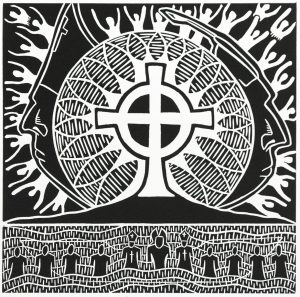
Monday 28th June, 2021
Coming of the Light
This Thursday, 1 July, is the 150th anniversary of The Coming of the Light to the Torres Strait Islands.
A Reflection from the Anglican Board of Mission, Australia:
Click for more
The London Missionary Society with Melanesian leaders landed on the shores of Darnley Island and introduced the Bible to the people who lived there. This event, The Coming of the Light, is an integral part of cultural identity to Torres Strait Islander peoples. It is marked as a public holiday within the region and there is much joy around its anniversary. It is also an important anniversary for the national Anglican church, hence its being in our lectionary.
The Coming of the Light invites us to reflect on our national history, on the good and the bad. It invites us to celebrate mission and ministry, particularly within the Torres Strait, and it invites us to listen to the church in the Torres Strait, which is made up of vibrant communities of hope.
In 2020, the Melanesian Brotherhood established a household on Thursday Island. The Melanesian Brotherhood is the world’s largest Anglican religious order and is headquartered in the Solomon Islands. The Brothers will live and minister at the cathedral on Thursday Island, nurturing community and supporting clergy and lay ministers across the islands of the Torres Strait.
The Anglican Church of Australia faces many challenges, and in the words of the Rev’d Canon Victor Joseph, it is time for the church to be “missioned to” by Aboriginal and Torres Strait Islander Christian leaders. The church in the Torres Strait has much to teach the church around Australia, much salt and light to offer. The Coming of the Light is not simply an historic event, it is an invitation for all of us to be changed by the work of God in the Torres Strait.
St John’s will be hosting an event to celebrate this anniversary on Sunday 4th July at 2pm.
Peace,
Peter+

Monday 21st June, 2021
Refugee Week
On 1st May 1517 the streets of London erupted. Angry locals attacked immigrants and looted their homes. Thomas More was the deputy sheriff of London at the time. He tried to protect the immigrants by reasoning with the crowd. The day came to be known as Evil May Day.
Click for more
In the late 16th Century William Shakespeare and two collaborators sought to bring prominence to the story. They wrote a play called The Book of Sir Thomas More. Shakespeare was responsible for penning a pro-immigrant speech which is placed on the lips of More. The original hand written manuscript of the speech is the only piece of writing existing in Shakespeare’s hand.
The authorities at the time banned the book and prevented the play from being performed for fear that its pro-immigrant stance would stir up resentment. The book was banned for 400 years.
Here is part of the speech Shakespeare wrote:
Imagine that you see the wretched strangers,
Their babies at their backs and their poor luggage,
Plodding tooth ports and costs for transportation,
And that you sit as kings in your desires,
Authority quite silent by your brawl,
And you in ruff of your opinions clothed;
What had you got? I’ll tell you. You had taught
How insolence and strong hand should prevail,
How order should be quelled; and by this pattern
Not one of you should live an aged man,
For other ruffians, as their fancies wrought,
With self same hand, self reasons, and self right,
Would shark on you, and men like ravenous fishes
Would feed on one another.
Sir Thomas More: Act 2, Scene 4
Shakespeare invites the reader to stand in the shoes of the despised immigrant.
What if it were you seeking asylum?
This week is Refugee Week.
The challenges remain unchanged.
Peace,
Peter+

Monday 7th June, 2021
PTSD (Land Forces Expo II)
Hi,
Bent double, like old beggars under sacks,
Knock-kneed, coughing like hags, we cursed through sludge,
Till on the haunting flares we turned our backs,
And towards our distant rest began to trudge…
Click for more
Hi,
Bent double, like old beggars under sacks,
Knock-kneed, coughing like hags, we cursed through sludge,
Till on the haunting flares we turned our backs,
And towards our distant rest began to trudge.
Men marched asleep. Many had lost their boots,
But limped on, blood-shod. All went lame; all blind;
Drunk with fatigue; deaf even to the hoots
Of gas-shells dropping softly behind.
Gas! GAS! Quick, boys!—An ecstasy of fumbling
Fitting the clumsy helmets just in time,
But someone still was yelling out and stumbling
And flound’ring like a man in fire or lime.—
Dim through the misty panes and thick green light,
As under a green sea, I saw him drowning.
In all my dreams before my helpless sight,
He plunges at me, guttering, choking, drowning.
If in some smothering dreams, you too could pace
Behind the wagon that we flung him in,
And watch the white eyes writhing in his face,
His hanging face, like a devil’s sick of sin;
If you could hear, at every jolt, the blood
Come gargling from the froth-corrupted lungs,
Obscene as cancer, bitter as the cud
Of vile, incurable sores on innocent tongues,—
My friend, you would not tell with such high zest
To children ardent for some desperate glory,
The old Lie: Dulce et decorum est
Pro patria mori.*
Wilfred Owen, Dulce et Decorum Est
* Dulce et decorum est pro patria mori = It is sweet and fitting to die for one’s country. (Horace)
This week I am still reeling from the fact that last week Brisbane was host to the Land Forces Expo, a trade fair for weapons.
I am not against having a defence force, but as US President Eisenhower warned in his farewell speech at the end of his presidency in 1961, to have an armaments industry that is driven by the profit motive and the need to grow businesses destabilises the world rather than making it a safer place.
This week’s poem was written by Wilfred Owen, one of the soldier poets, who responded to the carnage of World War I by writing poetry that stripped away the romanticism of war. Owen was himself treated for shell shock, which we now call PTSD, during the war. He was killed in action just one week before the war ended. The poem is stark in its imagery.
June is PTSD awareness month. Owen and his colleagues want us to remember that war is incredibly costly in human terms. We still have PTSD sufferers in our midst who served in World War II and Korea.
The Land Forces Expo received funding from the government, public money.
We say we value peace, but I have never heard of our governments funding a peace expo.
Blessed are the peacemakers….
Peace,
Peter+
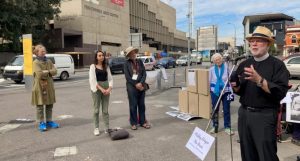
Wednesday 2nd June, 2021
The Land Forces Expo I
This week Brisbane is hosting the Land Forces Expo.
Largely unadvertised to the public the Expo is a three-day market selling weapons and military support services.
Click for more
This week Brisbane is hosting the Land Forces Expo. Largely unadvertised to the public the Expo is a three-day market selling weapons and military support services.
It is happening despite there having been no public conversation about our involvement in the international arms trade.
At the end of his two-term presidency of the USA in 1961, Dwight D Eisenhower, a former General, tried to warn his nation about the potential effects of what he labelled the Military-Industrial Complex. The Military-Industrial Complex is made up of companies that specialise in making and selling weapons. Like all businesses they want to grow. To grow they need people to use their weapons. Eisenhower could see how this market driven approach to weaponry could lead to an increased likelihood of armed conflict.
Eisenhower noted that before the World War II most armaments had been produced on an as needs basis by companies that manufactured sewing machines and other products for civilian use. These would turn their hand to making weapons when a conflict broke out in much the same way that several engineering companies have responded to the Covid-19 pandemic by retooling to make ventilators. Eisenhower’s words were not heeded and so the Industrial-Military Complex has grown. Large portions of the world have been destabilised.
Our Federal Government has the aim of making Australia one of the top ten producers of armaments in the world. The Land Forces Expo is part of promoting this expansion.
The Land Forces Expo is being held against the backdrop of our withdrawal from Afghanistan. The Afghan conflict is numbered by Australian academic, Henry Reynolds, amongst the list of Australia’s ‘unnecessary wars’. Reynolds contends that our leaders are far too willing to send our service personnel into conflicts. He says they use war, which has long term consequences, for short-term political gain.
The allegations that war crimes were committed by service personnel in Afghanistan remind us that war is a shadowy place. A place we should be reticent to send people. Too easily the rest of us allow our defence force personnel to go into places we would not go ourselves.
Siegfried Sassoon was a soldier and one of the World War I poets. The war poets were highly critical of the way leaders and people alike tend to treat war in a trivialised way:
You smug-faced crowds with kindling eye
Who cheer when soldier lads march by,
Sneak home and pray you’ll never know
The hell where youth and laughter go[1].
To the politicians Sassoon said:
Go round the soldiers’ cemeteries; and then
Talk of our noble sacrifice and losses
To the wooden crosses…[2]
Sassoon also wrote of the ‘impotent old friends’ sitting ‘snug at the club’ talking about how lucky their sons were to be at war.[3]
June is PTSD Awareness Month. We still have amongst us veterans for World War II and Vietnam who are living with PTSD, and increasing numbers produced through our involvement in Afghanistan. The human cost is high and long-felt.
And yet here we are aiming to become one of the top ten producers of armaments in the world and hosting a weapons Expo.
On the sermon on the Mount, Jesus said that the peacemakers are blessed, and the writer of Isaiah had a vision of swords being beaten into ploughshares. The presence of this Expo in our midst and our government’s ambitions for our armaments industry suggest that we are a long way from achieving that vision.
[1] Siegfried Sassoon, Suicide in The Trenches, http://www.greatwar.nl/children/suicide.html
[2] http://jamesmanlow.com/siegried-sassoon-first-world-war-poems/
[3] Siegfried Sassoon, The Fathers in Counter-Attack and Other Poems, 1918. https://www.bartleby.com/136/10.html
Peace,
Peter+
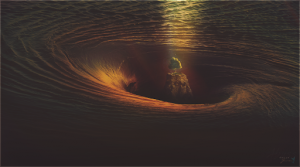
Monday 31st May, 2021
Trinity Sunday
Hi,
On a tranquil night, in deep silence
my boat softly glided onto the immense Ocean…
Click for more
Hi,
On a tranquil night, in deep silence
my boat softly glided onto the immense Ocean.
All was resting under the vault of the heavens
and seemed attentive to the great voice of God.
But suddenly great waves arose
and the fragile vessel disappeared beneath them.
It was the TRINITY which drew me to itself.
There I found my centre in the divine abyss.
I shall no longer be seen on the shore.
I dive into the Infinite, there is my portion.
My soul rests in this immensity
and lives with “the THREE” as if in eternity.
Elizabeth of Dijon
Sunday was Trinity Sunday, the day when we celebrate God, as three and one:
Father, Son and Holy Spirit or
Source of All Being, Eternal Word and Holy Spirt or
Creator, Redeemer and Sanctifier.
The idea of God being three and one has, down the years, led to some very complex theological writing. It takes a lot of head space to get around he idea that One can be three and three can be one.
Elizabeth of Dijon reminds us that the church came to the idea of God being a Trinity though experience, and she calls us back to that appreciation. As her poem suggests, if we give ourselves over to experience, particularly the experience of prayerful attending, then we are far more likely to ‘get’ God, despite God continuing to be a mystery.
Peace,
Peter+